Language and Media in Nigeria: Shaping Elections and National Development in 2023
VerifiedAdded on 2023/06/01
|25
|7626
|224
AI Summary
In this report we will discuss about language & media and below are the summaries point:-
Language and media have played influential roles in shaping Nigeria's socio-political landscape.
The paper analyzes their impact on national development and the outcome of the 2023 elections.
It explores the use of language and media in electioneering, including social media, slogans, and political advertisements.
Contribute Materials
Your contribution can guide someone’s learning journey. Share your
documents today.
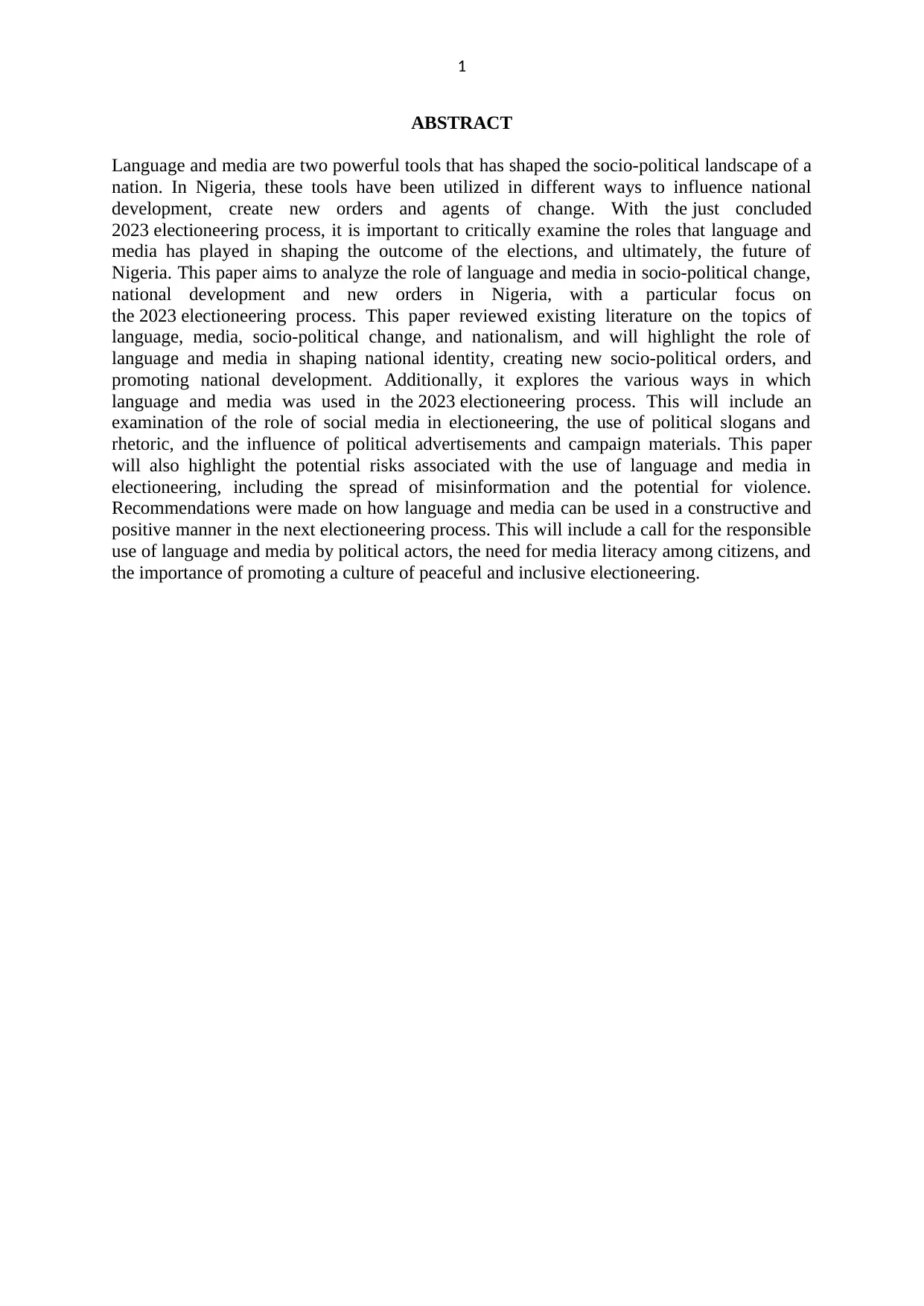
1
ABSTRACT
Language and media are two powerful tools that has shaped the socio-political landscape of a
nation. In Nigeria, these tools have been utilized in different ways to influence national
development, create new orders and agents of change. With the just concluded
2023 electioneering process, it is important to critically examine the roles that language and
media has played in shaping the outcome of the elections, and ultimately, the future of
Nigeria. This paper aims to analyze the role of language and media in socio-political change,
national development and new orders in Nigeria, with a particular focus on
the 2023 electioneering process. This paper reviewed existing literature on the topics of
language, media, socio-political change, and nationalism, and will highlight the role of
language and media in shaping national identity, creating new socio-political orders, and
promoting national development. Additionally, it explores the various ways in which
language and media was used in the 2023 electioneering process. This will include an
examination of the role of social media in electioneering, the use of political slogans and
rhetoric, and the influence of political advertisements and campaign materials. This paper
will also highlight the potential risks associated with the use of language and media in
electioneering, including the spread of misinformation and the potential for violence.
Recommendations were made on how language and media can be used in a constructive and
positive manner in the next electioneering process. This will include a call for the responsible
use of language and media by political actors, the need for media literacy among citizens, and
the importance of promoting a culture of peaceful and inclusive electioneering.
ABSTRACT
Language and media are two powerful tools that has shaped the socio-political landscape of a
nation. In Nigeria, these tools have been utilized in different ways to influence national
development, create new orders and agents of change. With the just concluded
2023 electioneering process, it is important to critically examine the roles that language and
media has played in shaping the outcome of the elections, and ultimately, the future of
Nigeria. This paper aims to analyze the role of language and media in socio-political change,
national development and new orders in Nigeria, with a particular focus on
the 2023 electioneering process. This paper reviewed existing literature on the topics of
language, media, socio-political change, and nationalism, and will highlight the role of
language and media in shaping national identity, creating new socio-political orders, and
promoting national development. Additionally, it explores the various ways in which
language and media was used in the 2023 electioneering process. This will include an
examination of the role of social media in electioneering, the use of political slogans and
rhetoric, and the influence of political advertisements and campaign materials. This paper
will also highlight the potential risks associated with the use of language and media in
electioneering, including the spread of misinformation and the potential for violence.
Recommendations were made on how language and media can be used in a constructive and
positive manner in the next electioneering process. This will include a call for the responsible
use of language and media by political actors, the need for media literacy among citizens, and
the importance of promoting a culture of peaceful and inclusive electioneering.
Secure Best Marks with AI Grader
Need help grading? Try our AI Grader for instant feedback on your assignments.
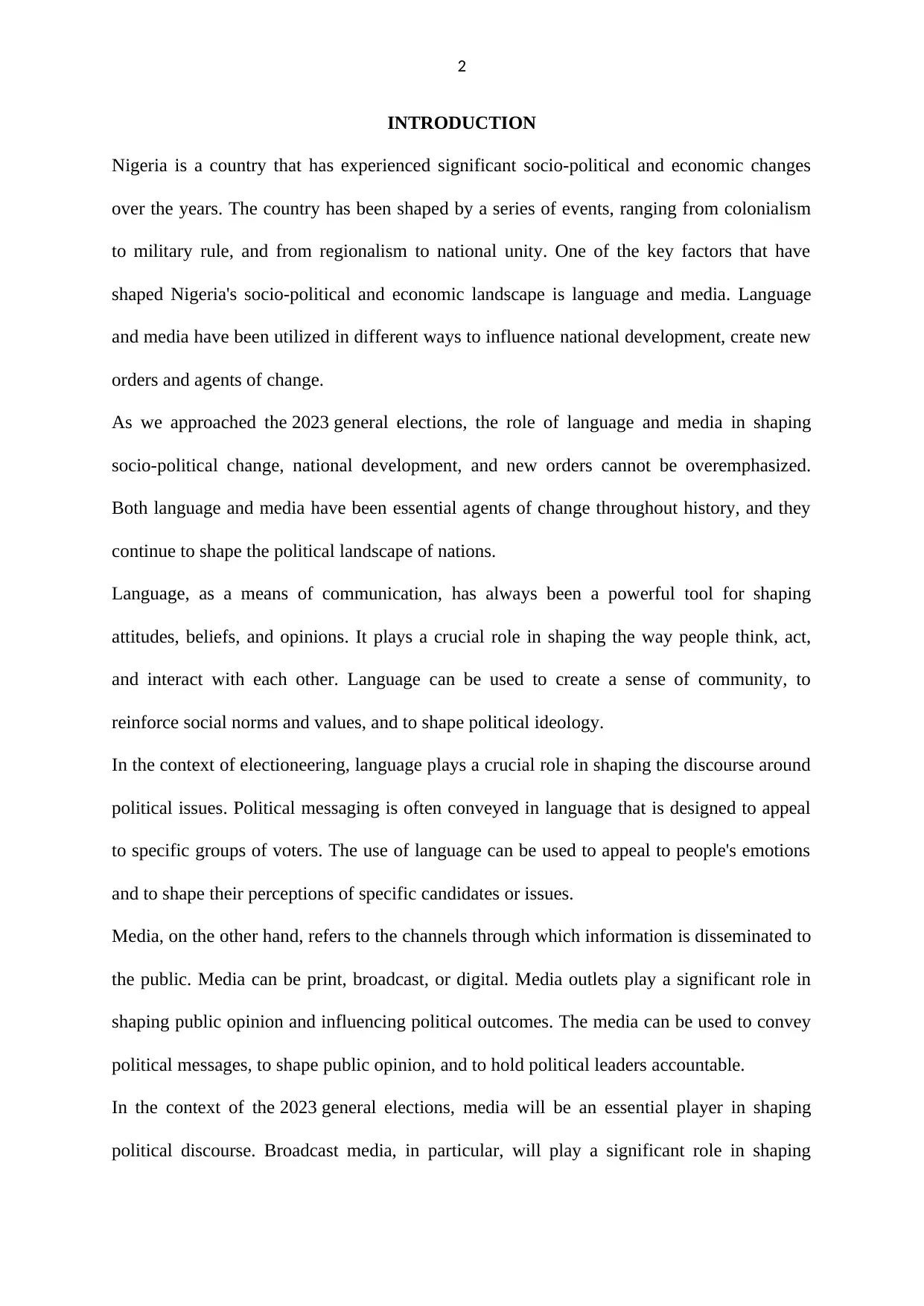
2
INTRODUCTION
Nigeria is a country that has experienced significant socio-political and economic changes
over the years. The country has been shaped by a series of events, ranging from colonialism
to military rule, and from regionalism to national unity. One of the key factors that have
shaped Nigeria's socio-political and economic landscape is language and media. Language
and media have been utilized in different ways to influence national development, create new
orders and agents of change.
As we approached the 2023 general elections, the role of language and media in shaping
socio-political change, national development, and new orders cannot be overemphasized.
Both language and media have been essential agents of change throughout history, and they
continue to shape the political landscape of nations.
Language, as a means of communication, has always been a powerful tool for shaping
attitudes, beliefs, and opinions. It plays a crucial role in shaping the way people think, act,
and interact with each other. Language can be used to create a sense of community, to
reinforce social norms and values, and to shape political ideology.
In the context of electioneering, language plays a crucial role in shaping the discourse around
political issues. Political messaging is often conveyed in language that is designed to appeal
to specific groups of voters. The use of language can be used to appeal to people's emotions
and to shape their perceptions of specific candidates or issues.
Media, on the other hand, refers to the channels through which information is disseminated to
the public. Media can be print, broadcast, or digital. Media outlets play a significant role in
shaping public opinion and influencing political outcomes. The media can be used to convey
political messages, to shape public opinion, and to hold political leaders accountable.
In the context of the 2023 general elections, media will be an essential player in shaping
political discourse. Broadcast media, in particular, will play a significant role in shaping
INTRODUCTION
Nigeria is a country that has experienced significant socio-political and economic changes
over the years. The country has been shaped by a series of events, ranging from colonialism
to military rule, and from regionalism to national unity. One of the key factors that have
shaped Nigeria's socio-political and economic landscape is language and media. Language
and media have been utilized in different ways to influence national development, create new
orders and agents of change.
As we approached the 2023 general elections, the role of language and media in shaping
socio-political change, national development, and new orders cannot be overemphasized.
Both language and media have been essential agents of change throughout history, and they
continue to shape the political landscape of nations.
Language, as a means of communication, has always been a powerful tool for shaping
attitudes, beliefs, and opinions. It plays a crucial role in shaping the way people think, act,
and interact with each other. Language can be used to create a sense of community, to
reinforce social norms and values, and to shape political ideology.
In the context of electioneering, language plays a crucial role in shaping the discourse around
political issues. Political messaging is often conveyed in language that is designed to appeal
to specific groups of voters. The use of language can be used to appeal to people's emotions
and to shape their perceptions of specific candidates or issues.
Media, on the other hand, refers to the channels through which information is disseminated to
the public. Media can be print, broadcast, or digital. Media outlets play a significant role in
shaping public opinion and influencing political outcomes. The media can be used to convey
political messages, to shape public opinion, and to hold political leaders accountable.
In the context of the 2023 general elections, media will be an essential player in shaping
political discourse. Broadcast media, in particular, will play a significant role in shaping
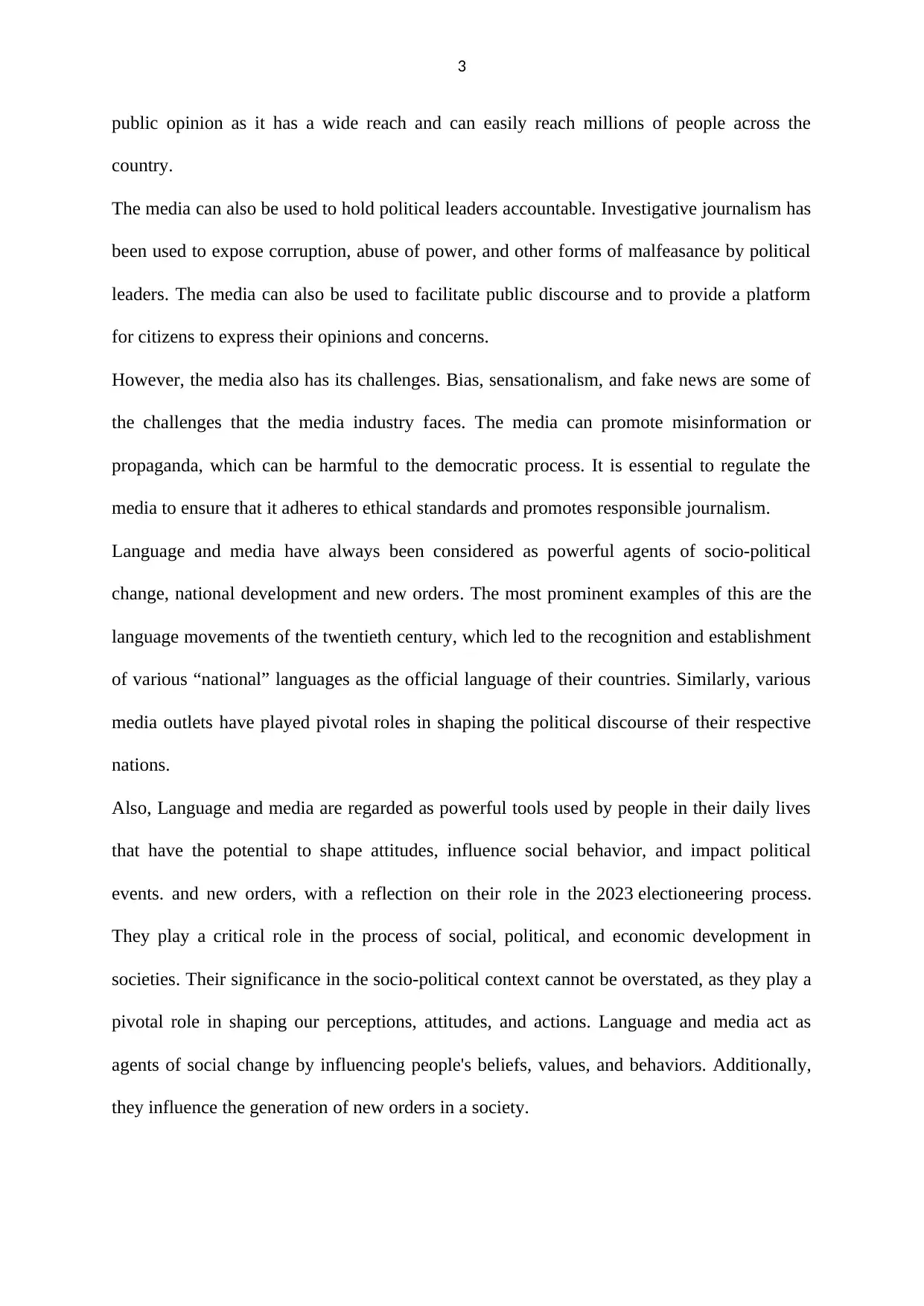
3
public opinion as it has a wide reach and can easily reach millions of people across the
country.
The media can also be used to hold political leaders accountable. Investigative journalism has
been used to expose corruption, abuse of power, and other forms of malfeasance by political
leaders. The media can also be used to facilitate public discourse and to provide a platform
for citizens to express their opinions and concerns.
However, the media also has its challenges. Bias, sensationalism, and fake news are some of
the challenges that the media industry faces. The media can promote misinformation or
propaganda, which can be harmful to the democratic process. It is essential to regulate the
media to ensure that it adheres to ethical standards and promotes responsible journalism.
Language and media have always been considered as powerful agents of socio-political
change, national development and new orders. The most prominent examples of this are the
language movements of the twentieth century, which led to the recognition and establishment
of various “national” languages as the official language of their countries. Similarly, various
media outlets have played pivotal roles in shaping the political discourse of their respective
nations.
Also, Language and media are regarded as powerful tools used by people in their daily lives
that have the potential to shape attitudes, influence social behavior, and impact political
events. and new orders, with a reflection on their role in the 2023 electioneering process.
They play a critical role in the process of social, political, and economic development in
societies. Their significance in the socio-political context cannot be overstated, as they play a
pivotal role in shaping our perceptions, attitudes, and actions. Language and media act as
agents of social change by influencing people's beliefs, values, and behaviors. Additionally,
they influence the generation of new orders in a society.
public opinion as it has a wide reach and can easily reach millions of people across the
country.
The media can also be used to hold political leaders accountable. Investigative journalism has
been used to expose corruption, abuse of power, and other forms of malfeasance by political
leaders. The media can also be used to facilitate public discourse and to provide a platform
for citizens to express their opinions and concerns.
However, the media also has its challenges. Bias, sensationalism, and fake news are some of
the challenges that the media industry faces. The media can promote misinformation or
propaganda, which can be harmful to the democratic process. It is essential to regulate the
media to ensure that it adheres to ethical standards and promotes responsible journalism.
Language and media have always been considered as powerful agents of socio-political
change, national development and new orders. The most prominent examples of this are the
language movements of the twentieth century, which led to the recognition and establishment
of various “national” languages as the official language of their countries. Similarly, various
media outlets have played pivotal roles in shaping the political discourse of their respective
nations.
Also, Language and media are regarded as powerful tools used by people in their daily lives
that have the potential to shape attitudes, influence social behavior, and impact political
events. and new orders, with a reflection on their role in the 2023 electioneering process.
They play a critical role in the process of social, political, and economic development in
societies. Their significance in the socio-political context cannot be overstated, as they play a
pivotal role in shaping our perceptions, attitudes, and actions. Language and media act as
agents of social change by influencing people's beliefs, values, and behaviors. Additionally,
they influence the generation of new orders in a society.
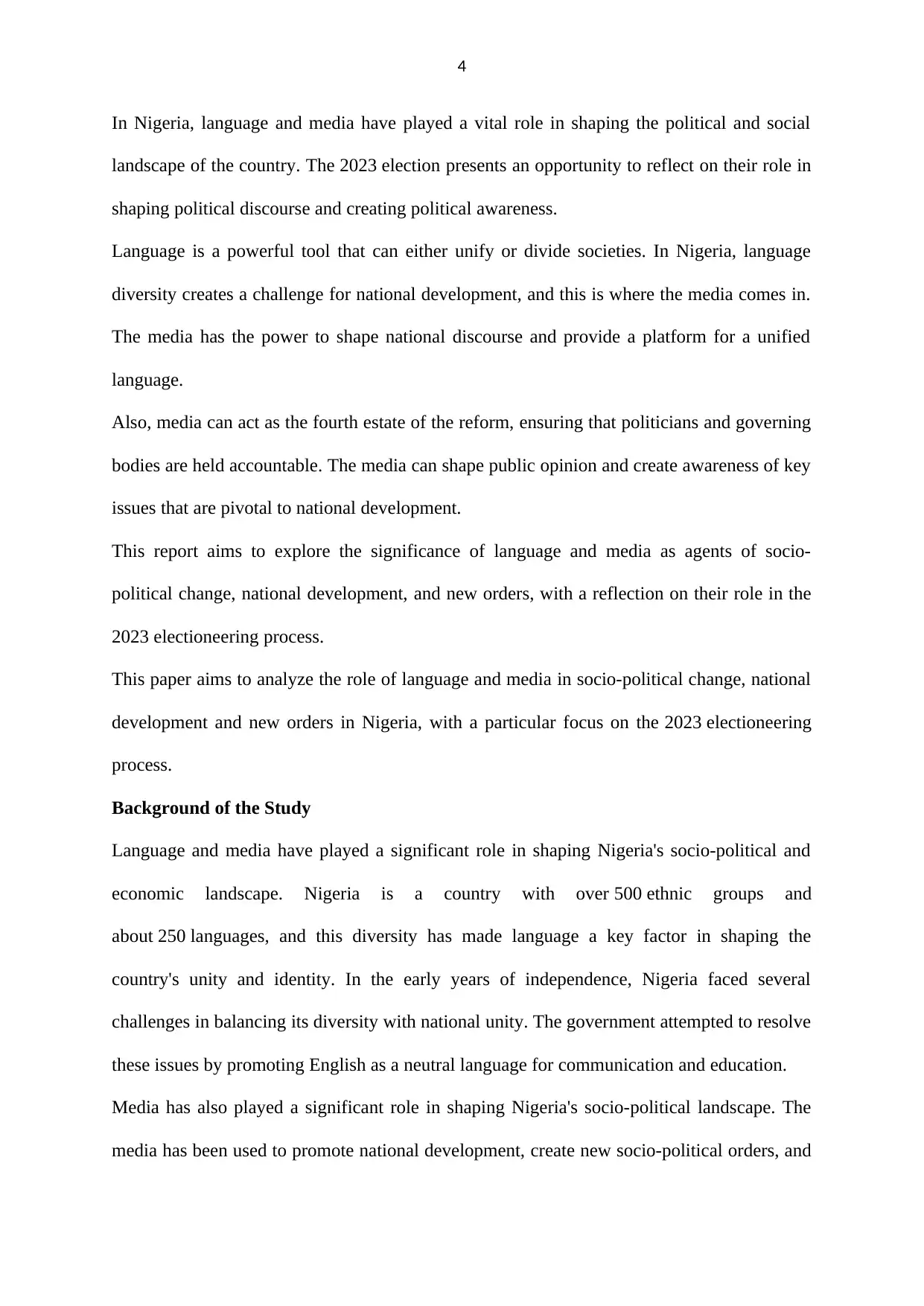
4
In Nigeria, language and media have played a vital role in shaping the political and social
landscape of the country. The 2023 election presents an opportunity to reflect on their role in
shaping political discourse and creating political awareness.
Language is a powerful tool that can either unify or divide societies. In Nigeria, language
diversity creates a challenge for national development, and this is where the media comes in.
The media has the power to shape national discourse and provide a platform for a unified
language.
Also, media can act as the fourth estate of the reform, ensuring that politicians and governing
bodies are held accountable. The media can shape public opinion and create awareness of key
issues that are pivotal to national development.
This report aims to explore the significance of language and media as agents of socio-
political change, national development, and new orders, with a reflection on their role in the
2023 electioneering process.
This paper aims to analyze the role of language and media in socio-political change, national
development and new orders in Nigeria, with a particular focus on the 2023 electioneering
process.
Background of the Study
Language and media have played a significant role in shaping Nigeria's socio-political and
economic landscape. Nigeria is a country with over 500 ethnic groups and
about 250 languages, and this diversity has made language a key factor in shaping the
country's unity and identity. In the early years of independence, Nigeria faced several
challenges in balancing its diversity with national unity. The government attempted to resolve
these issues by promoting English as a neutral language for communication and education.
Media has also played a significant role in shaping Nigeria's socio-political landscape. The
media has been used to promote national development, create new socio-political orders, and
In Nigeria, language and media have played a vital role in shaping the political and social
landscape of the country. The 2023 election presents an opportunity to reflect on their role in
shaping political discourse and creating political awareness.
Language is a powerful tool that can either unify or divide societies. In Nigeria, language
diversity creates a challenge for national development, and this is where the media comes in.
The media has the power to shape national discourse and provide a platform for a unified
language.
Also, media can act as the fourth estate of the reform, ensuring that politicians and governing
bodies are held accountable. The media can shape public opinion and create awareness of key
issues that are pivotal to national development.
This report aims to explore the significance of language and media as agents of socio-
political change, national development, and new orders, with a reflection on their role in the
2023 electioneering process.
This paper aims to analyze the role of language and media in socio-political change, national
development and new orders in Nigeria, with a particular focus on the 2023 electioneering
process.
Background of the Study
Language and media have played a significant role in shaping Nigeria's socio-political and
economic landscape. Nigeria is a country with over 500 ethnic groups and
about 250 languages, and this diversity has made language a key factor in shaping the
country's unity and identity. In the early years of independence, Nigeria faced several
challenges in balancing its diversity with national unity. The government attempted to resolve
these issues by promoting English as a neutral language for communication and education.
Media has also played a significant role in shaping Nigeria's socio-political landscape. The
media has been used to promote national development, create new socio-political orders, and
Secure Best Marks with AI Grader
Need help grading? Try our AI Grader for instant feedback on your assignments.
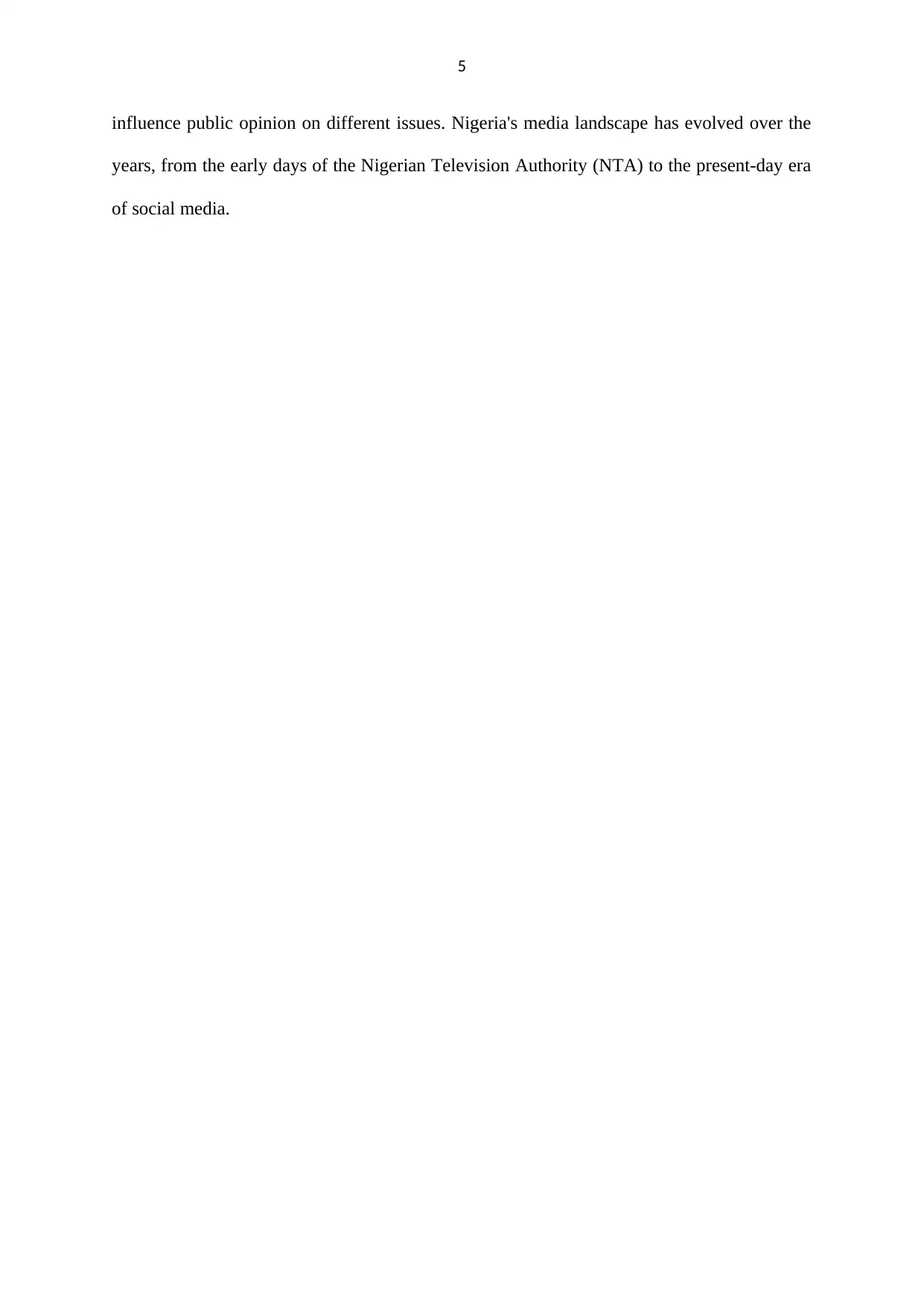
5
influence public opinion on different issues. Nigeria's media landscape has evolved over the
years, from the early days of the Nigerian Television Authority (NTA) to the present-day era
of social media.
influence public opinion on different issues. Nigeria's media landscape has evolved over the
years, from the early days of the Nigerian Television Authority (NTA) to the present-day era
of social media.
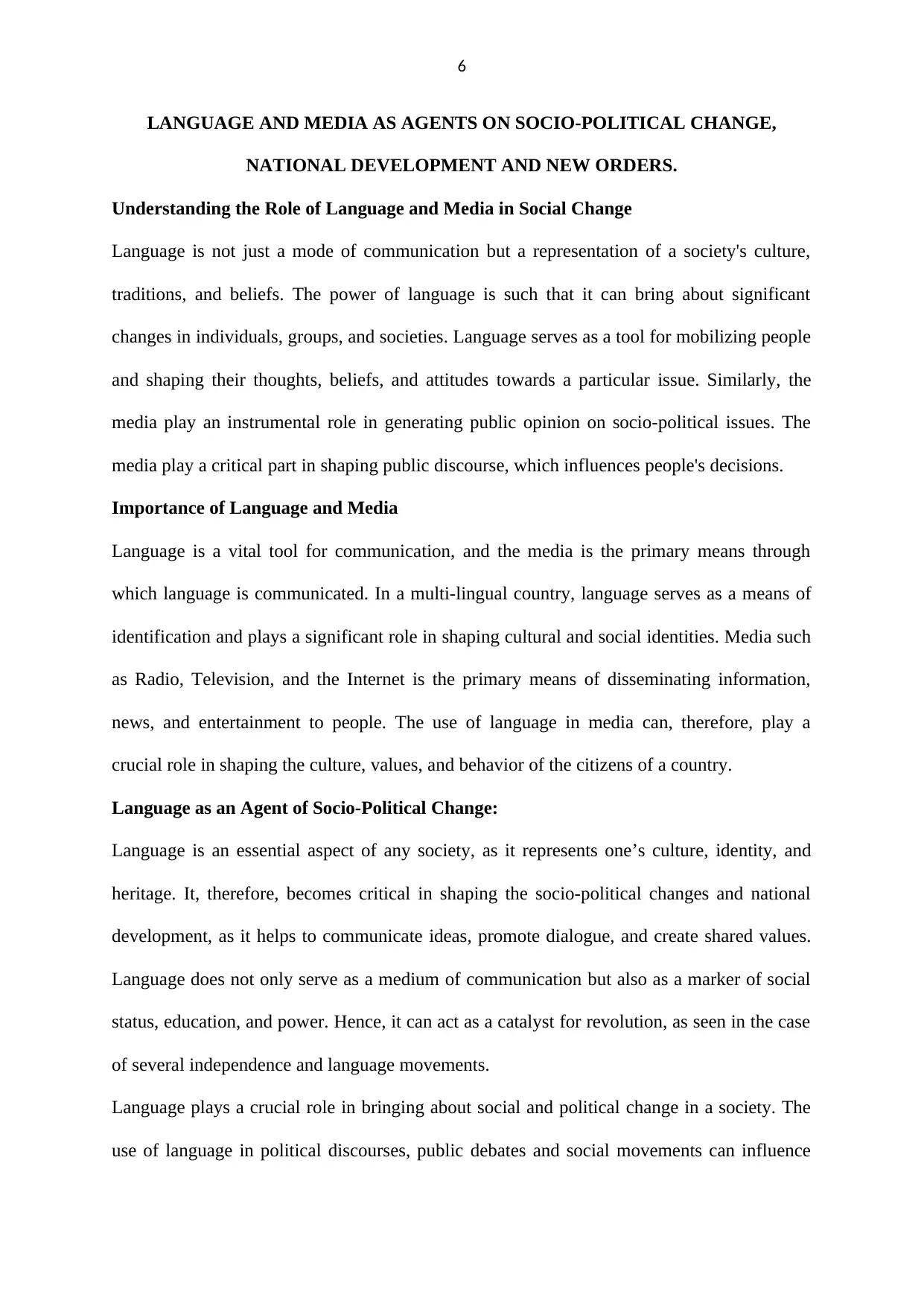
6
LANGUAGE AND MEDIA AS AGENTS ON SOCIO-POLITICAL CHANGE,
NATIONAL DEVELOPMENT AND NEW ORDERS.
Understanding the Role of Language and Media in Social Change
Language is not just a mode of communication but a representation of a society's culture,
traditions, and beliefs. The power of language is such that it can bring about significant
changes in individuals, groups, and societies. Language serves as a tool for mobilizing people
and shaping their thoughts, beliefs, and attitudes towards a particular issue. Similarly, the
media play an instrumental role in generating public opinion on socio-political issues. The
media play a critical part in shaping public discourse, which influences people's decisions.
Importance of Language and Media
Language is a vital tool for communication, and the media is the primary means through
which language is communicated. In a multi-lingual country, language serves as a means of
identification and plays a significant role in shaping cultural and social identities. Media such
as Radio, Television, and the Internet is the primary means of disseminating information,
news, and entertainment to people. The use of language in media can, therefore, play a
crucial role in shaping the culture, values, and behavior of the citizens of a country.
Language as an Agent of Socio-Political Change:
Language is an essential aspect of any society, as it represents one’s culture, identity, and
heritage. It, therefore, becomes critical in shaping the socio-political changes and national
development, as it helps to communicate ideas, promote dialogue, and create shared values.
Language does not only serve as a medium of communication but also as a marker of social
status, education, and power. Hence, it can act as a catalyst for revolution, as seen in the case
of several independence and language movements.
Language plays a crucial role in bringing about social and political change in a society. The
use of language in political discourses, public debates and social movements can influence
LANGUAGE AND MEDIA AS AGENTS ON SOCIO-POLITICAL CHANGE,
NATIONAL DEVELOPMENT AND NEW ORDERS.
Understanding the Role of Language and Media in Social Change
Language is not just a mode of communication but a representation of a society's culture,
traditions, and beliefs. The power of language is such that it can bring about significant
changes in individuals, groups, and societies. Language serves as a tool for mobilizing people
and shaping their thoughts, beliefs, and attitudes towards a particular issue. Similarly, the
media play an instrumental role in generating public opinion on socio-political issues. The
media play a critical part in shaping public discourse, which influences people's decisions.
Importance of Language and Media
Language is a vital tool for communication, and the media is the primary means through
which language is communicated. In a multi-lingual country, language serves as a means of
identification and plays a significant role in shaping cultural and social identities. Media such
as Radio, Television, and the Internet is the primary means of disseminating information,
news, and entertainment to people. The use of language in media can, therefore, play a
crucial role in shaping the culture, values, and behavior of the citizens of a country.
Language as an Agent of Socio-Political Change:
Language is an essential aspect of any society, as it represents one’s culture, identity, and
heritage. It, therefore, becomes critical in shaping the socio-political changes and national
development, as it helps to communicate ideas, promote dialogue, and create shared values.
Language does not only serve as a medium of communication but also as a marker of social
status, education, and power. Hence, it can act as a catalyst for revolution, as seen in the case
of several independence and language movements.
Language plays a crucial role in bringing about social and political change in a society. The
use of language in political discourses, public debates and social movements can influence
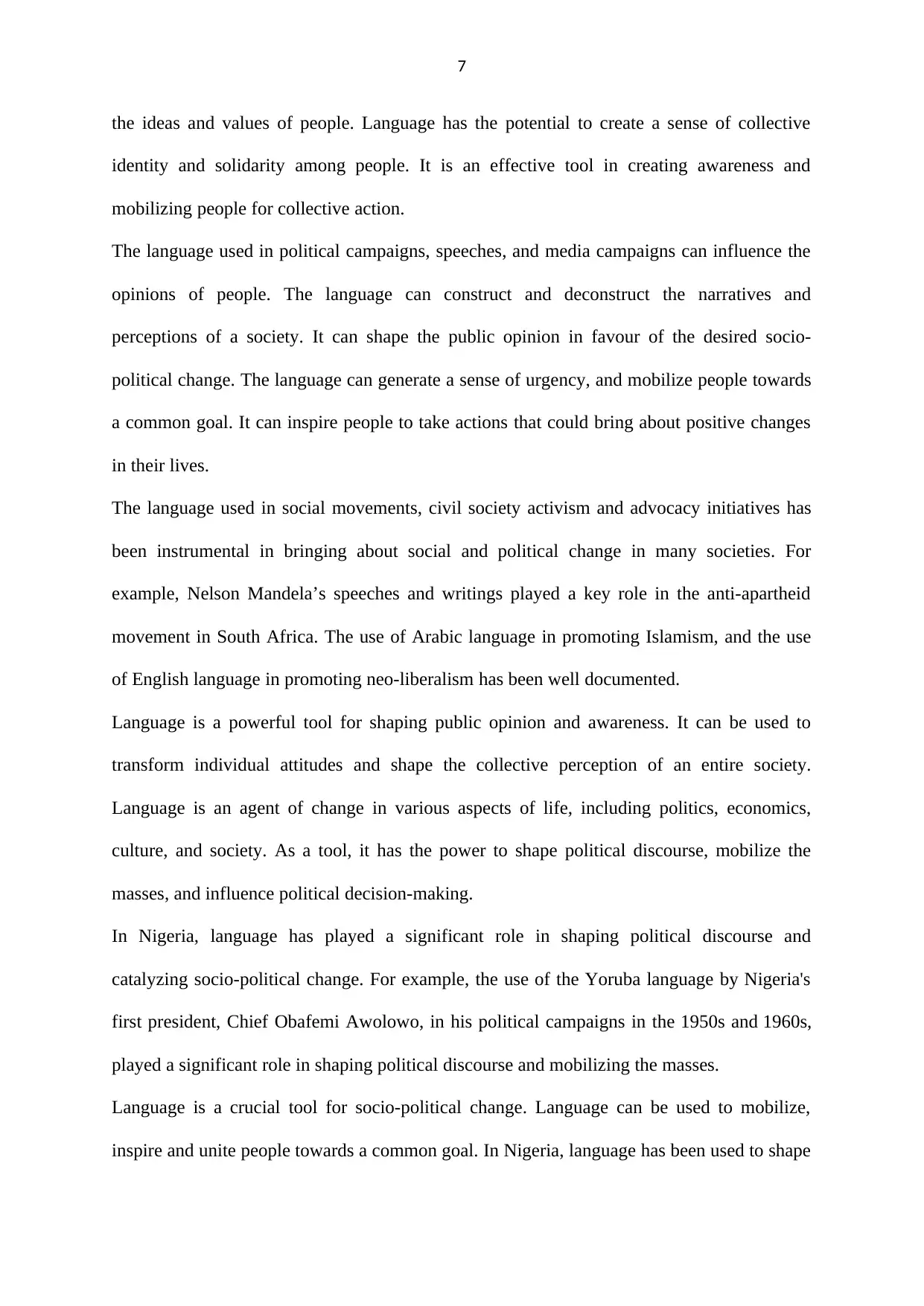
7
the ideas and values of people. Language has the potential to create a sense of collective
identity and solidarity among people. It is an effective tool in creating awareness and
mobilizing people for collective action.
The language used in political campaigns, speeches, and media campaigns can influence the
opinions of people. The language can construct and deconstruct the narratives and
perceptions of a society. It can shape the public opinion in favour of the desired socio-
political change. The language can generate a sense of urgency, and mobilize people towards
a common goal. It can inspire people to take actions that could bring about positive changes
in their lives.
The language used in social movements, civil society activism and advocacy initiatives has
been instrumental in bringing about social and political change in many societies. For
example, Nelson Mandela’s speeches and writings played a key role in the anti-apartheid
movement in South Africa. The use of Arabic language in promoting Islamism, and the use
of English language in promoting neo-liberalism has been well documented.
Language is a powerful tool for shaping public opinion and awareness. It can be used to
transform individual attitudes and shape the collective perception of an entire society.
Language is an agent of change in various aspects of life, including politics, economics,
culture, and society. As a tool, it has the power to shape political discourse, mobilize the
masses, and influence political decision-making.
In Nigeria, language has played a significant role in shaping political discourse and
catalyzing socio-political change. For example, the use of the Yoruba language by Nigeria's
first president, Chief Obafemi Awolowo, in his political campaigns in the 1950s and 1960s,
played a significant role in shaping political discourse and mobilizing the masses.
Language is a crucial tool for socio-political change. Language can be used to mobilize,
inspire and unite people towards a common goal. In Nigeria, language has been used to shape
the ideas and values of people. Language has the potential to create a sense of collective
identity and solidarity among people. It is an effective tool in creating awareness and
mobilizing people for collective action.
The language used in political campaigns, speeches, and media campaigns can influence the
opinions of people. The language can construct and deconstruct the narratives and
perceptions of a society. It can shape the public opinion in favour of the desired socio-
political change. The language can generate a sense of urgency, and mobilize people towards
a common goal. It can inspire people to take actions that could bring about positive changes
in their lives.
The language used in social movements, civil society activism and advocacy initiatives has
been instrumental in bringing about social and political change in many societies. For
example, Nelson Mandela’s speeches and writings played a key role in the anti-apartheid
movement in South Africa. The use of Arabic language in promoting Islamism, and the use
of English language in promoting neo-liberalism has been well documented.
Language is a powerful tool for shaping public opinion and awareness. It can be used to
transform individual attitudes and shape the collective perception of an entire society.
Language is an agent of change in various aspects of life, including politics, economics,
culture, and society. As a tool, it has the power to shape political discourse, mobilize the
masses, and influence political decision-making.
In Nigeria, language has played a significant role in shaping political discourse and
catalyzing socio-political change. For example, the use of the Yoruba language by Nigeria's
first president, Chief Obafemi Awolowo, in his political campaigns in the 1950s and 1960s,
played a significant role in shaping political discourse and mobilizing the masses.
Language is a crucial tool for socio-political change. Language can be used to mobilize,
inspire and unite people towards a common goal. In Nigeria, language has been used to shape
Paraphrase This Document
Need a fresh take? Get an instant paraphrase of this document with our AI Paraphraser
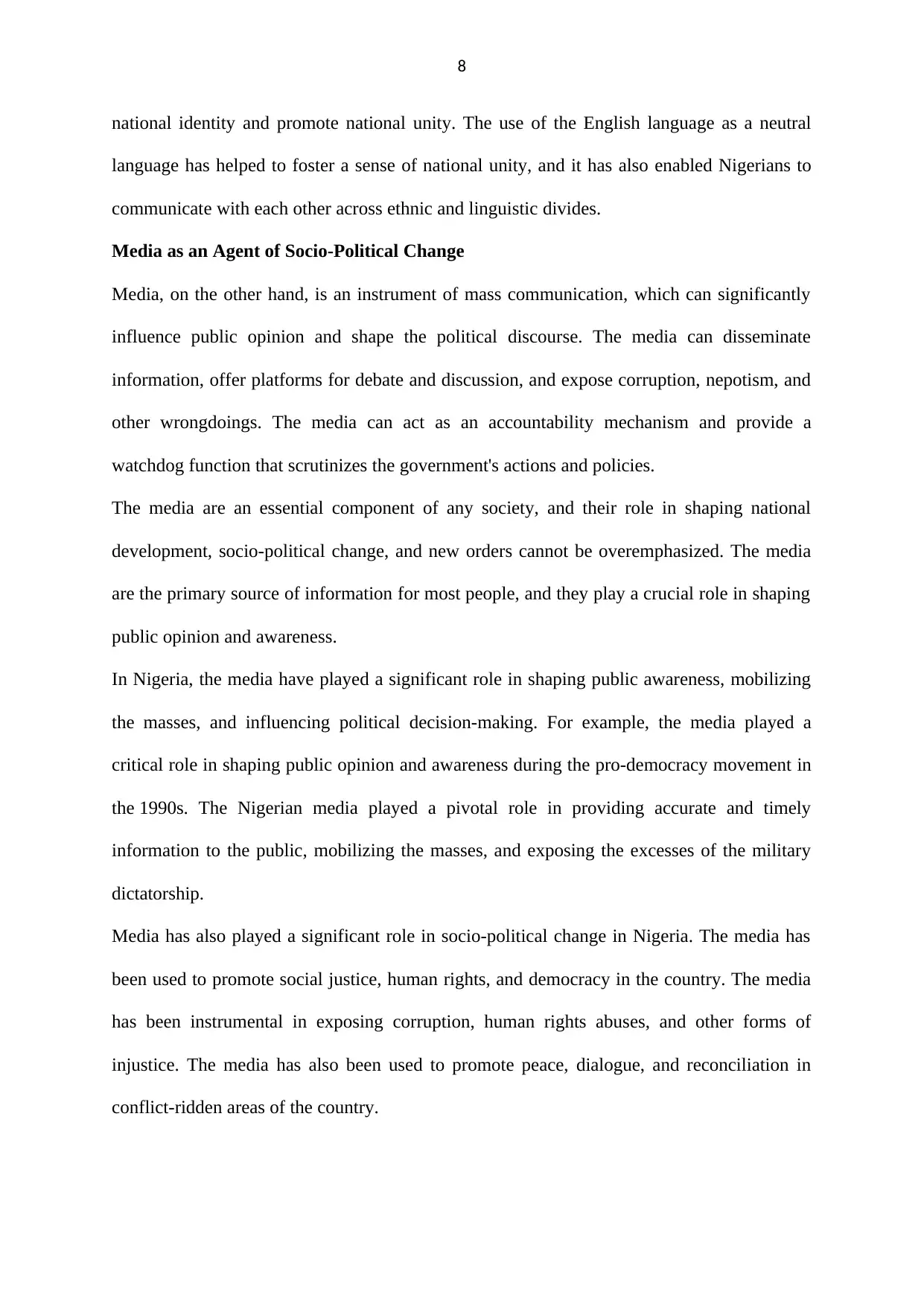
8
national identity and promote national unity. The use of the English language as a neutral
language has helped to foster a sense of national unity, and it has also enabled Nigerians to
communicate with each other across ethnic and linguistic divides.
Media as an Agent of Socio-Political Change
Media, on the other hand, is an instrument of mass communication, which can significantly
influence public opinion and shape the political discourse. The media can disseminate
information, offer platforms for debate and discussion, and expose corruption, nepotism, and
other wrongdoings. The media can act as an accountability mechanism and provide a
watchdog function that scrutinizes the government's actions and policies.
The media are an essential component of any society, and their role in shaping national
development, socio-political change, and new orders cannot be overemphasized. The media
are the primary source of information for most people, and they play a crucial role in shaping
public opinion and awareness.
In Nigeria, the media have played a significant role in shaping public awareness, mobilizing
the masses, and influencing political decision-making. For example, the media played a
critical role in shaping public opinion and awareness during the pro-democracy movement in
the 1990s. The Nigerian media played a pivotal role in providing accurate and timely
information to the public, mobilizing the masses, and exposing the excesses of the military
dictatorship.
Media has also played a significant role in socio-political change in Nigeria. The media has
been used to promote social justice, human rights, and democracy in the country. The media
has been instrumental in exposing corruption, human rights abuses, and other forms of
injustice. The media has also been used to promote peace, dialogue, and reconciliation in
conflict-ridden areas of the country.
national identity and promote national unity. The use of the English language as a neutral
language has helped to foster a sense of national unity, and it has also enabled Nigerians to
communicate with each other across ethnic and linguistic divides.
Media as an Agent of Socio-Political Change
Media, on the other hand, is an instrument of mass communication, which can significantly
influence public opinion and shape the political discourse. The media can disseminate
information, offer platforms for debate and discussion, and expose corruption, nepotism, and
other wrongdoings. The media can act as an accountability mechanism and provide a
watchdog function that scrutinizes the government's actions and policies.
The media are an essential component of any society, and their role in shaping national
development, socio-political change, and new orders cannot be overemphasized. The media
are the primary source of information for most people, and they play a crucial role in shaping
public opinion and awareness.
In Nigeria, the media have played a significant role in shaping public awareness, mobilizing
the masses, and influencing political decision-making. For example, the media played a
critical role in shaping public opinion and awareness during the pro-democracy movement in
the 1990s. The Nigerian media played a pivotal role in providing accurate and timely
information to the public, mobilizing the masses, and exposing the excesses of the military
dictatorship.
Media has also played a significant role in socio-political change in Nigeria. The media has
been used to promote social justice, human rights, and democracy in the country. The media
has been instrumental in exposing corruption, human rights abuses, and other forms of
injustice. The media has also been used to promote peace, dialogue, and reconciliation in
conflict-ridden areas of the country.
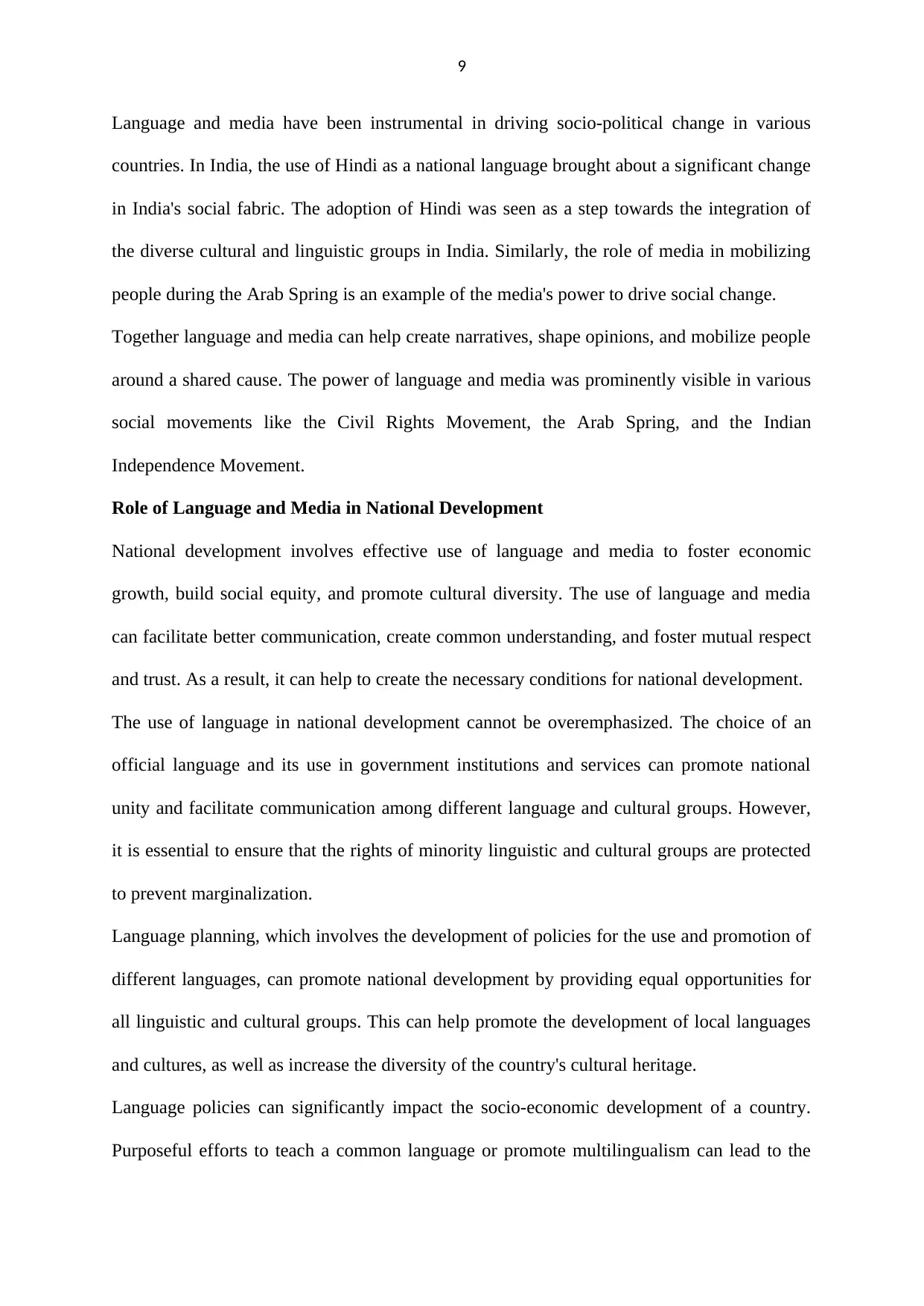
9
Language and media have been instrumental in driving socio-political change in various
countries. In India, the use of Hindi as a national language brought about a significant change
in India's social fabric. The adoption of Hindi was seen as a step towards the integration of
the diverse cultural and linguistic groups in India. Similarly, the role of media in mobilizing
people during the Arab Spring is an example of the media's power to drive social change.
Together language and media can help create narratives, shape opinions, and mobilize people
around a shared cause. The power of language and media was prominently visible in various
social movements like the Civil Rights Movement, the Arab Spring, and the Indian
Independence Movement.
Role of Language and Media in National Development
National development involves effective use of language and media to foster economic
growth, build social equity, and promote cultural diversity. The use of language and media
can facilitate better communication, create common understanding, and foster mutual respect
and trust. As a result, it can help to create the necessary conditions for national development.
The use of language in national development cannot be overemphasized. The choice of an
official language and its use in government institutions and services can promote national
unity and facilitate communication among different language and cultural groups. However,
it is essential to ensure that the rights of minority linguistic and cultural groups are protected
to prevent marginalization.
Language planning, which involves the development of policies for the use and promotion of
different languages, can promote national development by providing equal opportunities for
all linguistic and cultural groups. This can help promote the development of local languages
and cultures, as well as increase the diversity of the country's cultural heritage.
Language policies can significantly impact the socio-economic development of a country.
Purposeful efforts to teach a common language or promote multilingualism can lead to the
Language and media have been instrumental in driving socio-political change in various
countries. In India, the use of Hindi as a national language brought about a significant change
in India's social fabric. The adoption of Hindi was seen as a step towards the integration of
the diverse cultural and linguistic groups in India. Similarly, the role of media in mobilizing
people during the Arab Spring is an example of the media's power to drive social change.
Together language and media can help create narratives, shape opinions, and mobilize people
around a shared cause. The power of language and media was prominently visible in various
social movements like the Civil Rights Movement, the Arab Spring, and the Indian
Independence Movement.
Role of Language and Media in National Development
National development involves effective use of language and media to foster economic
growth, build social equity, and promote cultural diversity. The use of language and media
can facilitate better communication, create common understanding, and foster mutual respect
and trust. As a result, it can help to create the necessary conditions for national development.
The use of language in national development cannot be overemphasized. The choice of an
official language and its use in government institutions and services can promote national
unity and facilitate communication among different language and cultural groups. However,
it is essential to ensure that the rights of minority linguistic and cultural groups are protected
to prevent marginalization.
Language planning, which involves the development of policies for the use and promotion of
different languages, can promote national development by providing equal opportunities for
all linguistic and cultural groups. This can help promote the development of local languages
and cultures, as well as increase the diversity of the country's cultural heritage.
Language policies can significantly impact the socio-economic development of a country.
Purposeful efforts to teach a common language or promote multilingualism can lead to the
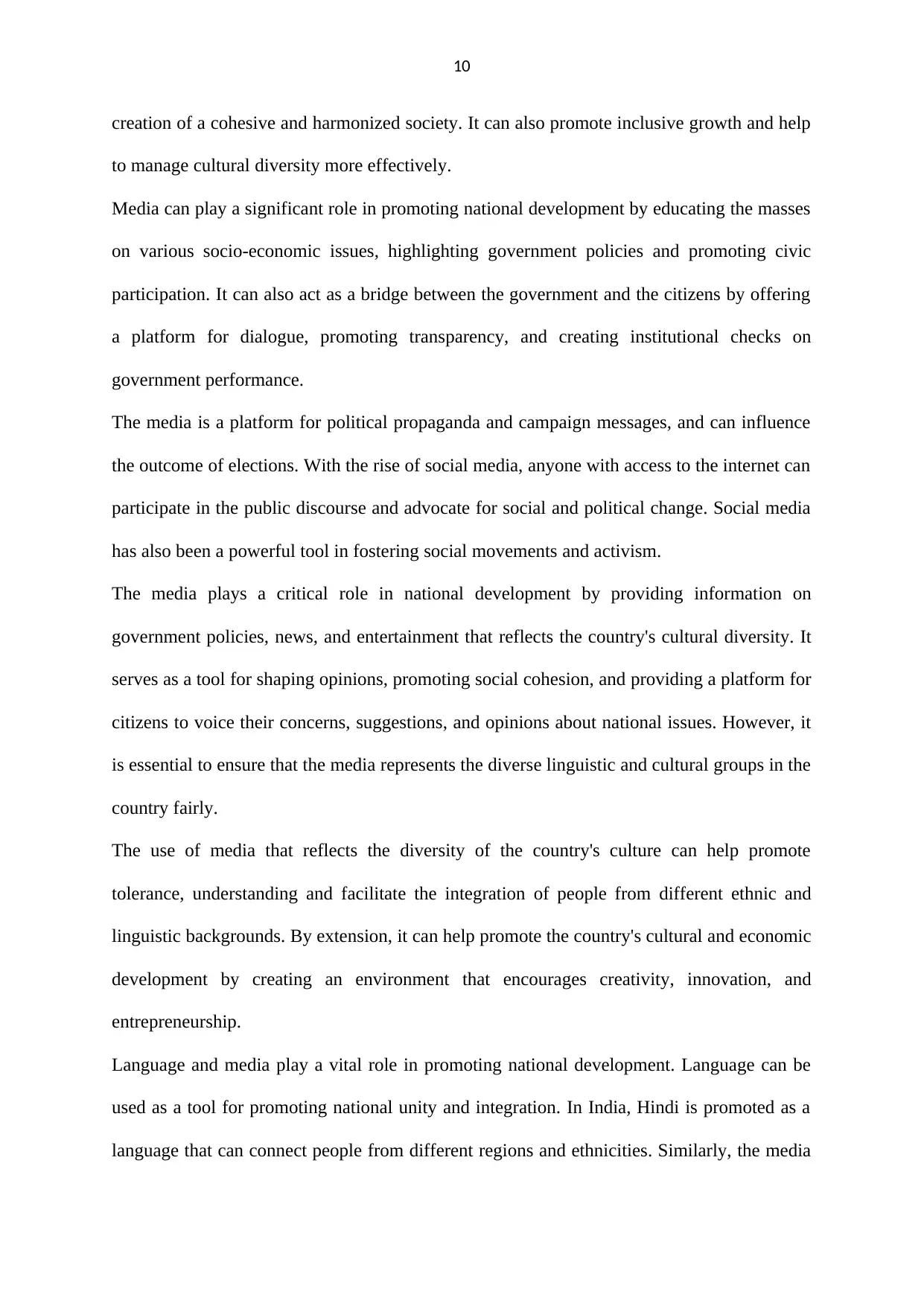
10
creation of a cohesive and harmonized society. It can also promote inclusive growth and help
to manage cultural diversity more effectively.
Media can play a significant role in promoting national development by educating the masses
on various socio-economic issues, highlighting government policies and promoting civic
participation. It can also act as a bridge between the government and the citizens by offering
a platform for dialogue, promoting transparency, and creating institutional checks on
government performance.
The media is a platform for political propaganda and campaign messages, and can influence
the outcome of elections. With the rise of social media, anyone with access to the internet can
participate in the public discourse and advocate for social and political change. Social media
has also been a powerful tool in fostering social movements and activism.
The media plays a critical role in national development by providing information on
government policies, news, and entertainment that reflects the country's cultural diversity. It
serves as a tool for shaping opinions, promoting social cohesion, and providing a platform for
citizens to voice their concerns, suggestions, and opinions about national issues. However, it
is essential to ensure that the media represents the diverse linguistic and cultural groups in the
country fairly.
The use of media that reflects the diversity of the country's culture can help promote
tolerance, understanding and facilitate the integration of people from different ethnic and
linguistic backgrounds. By extension, it can help promote the country's cultural and economic
development by creating an environment that encourages creativity, innovation, and
entrepreneurship.
Language and media play a vital role in promoting national development. Language can be
used as a tool for promoting national unity and integration. In India, Hindi is promoted as a
language that can connect people from different regions and ethnicities. Similarly, the media
creation of a cohesive and harmonized society. It can also promote inclusive growth and help
to manage cultural diversity more effectively.
Media can play a significant role in promoting national development by educating the masses
on various socio-economic issues, highlighting government policies and promoting civic
participation. It can also act as a bridge between the government and the citizens by offering
a platform for dialogue, promoting transparency, and creating institutional checks on
government performance.
The media is a platform for political propaganda and campaign messages, and can influence
the outcome of elections. With the rise of social media, anyone with access to the internet can
participate in the public discourse and advocate for social and political change. Social media
has also been a powerful tool in fostering social movements and activism.
The media plays a critical role in national development by providing information on
government policies, news, and entertainment that reflects the country's cultural diversity. It
serves as a tool for shaping opinions, promoting social cohesion, and providing a platform for
citizens to voice their concerns, suggestions, and opinions about national issues. However, it
is essential to ensure that the media represents the diverse linguistic and cultural groups in the
country fairly.
The use of media that reflects the diversity of the country's culture can help promote
tolerance, understanding and facilitate the integration of people from different ethnic and
linguistic backgrounds. By extension, it can help promote the country's cultural and economic
development by creating an environment that encourages creativity, innovation, and
entrepreneurship.
Language and media play a vital role in promoting national development. Language can be
used as a tool for promoting national unity and integration. In India, Hindi is promoted as a
language that can connect people from different regions and ethnicities. Similarly, the media
Secure Best Marks with AI Grader
Need help grading? Try our AI Grader for instant feedback on your assignments.
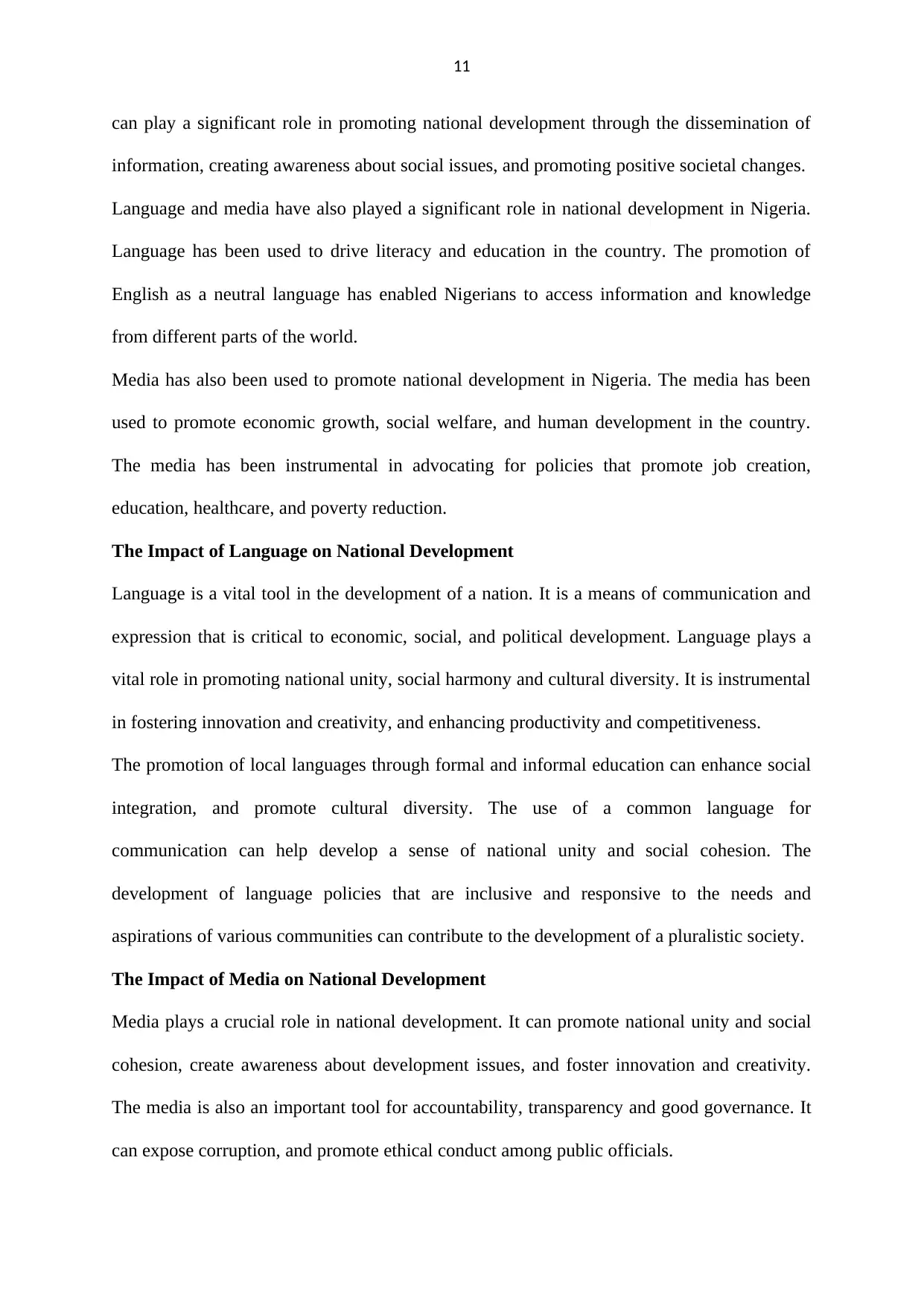
11
can play a significant role in promoting national development through the dissemination of
information, creating awareness about social issues, and promoting positive societal changes.
Language and media have also played a significant role in national development in Nigeria.
Language has been used to drive literacy and education in the country. The promotion of
English as a neutral language has enabled Nigerians to access information and knowledge
from different parts of the world.
Media has also been used to promote national development in Nigeria. The media has been
used to promote economic growth, social welfare, and human development in the country.
The media has been instrumental in advocating for policies that promote job creation,
education, healthcare, and poverty reduction.
The Impact of Language on National Development
Language is a vital tool in the development of a nation. It is a means of communication and
expression that is critical to economic, social, and political development. Language plays a
vital role in promoting national unity, social harmony and cultural diversity. It is instrumental
in fostering innovation and creativity, and enhancing productivity and competitiveness.
The promotion of local languages through formal and informal education can enhance social
integration, and promote cultural diversity. The use of a common language for
communication can help develop a sense of national unity and social cohesion. The
development of language policies that are inclusive and responsive to the needs and
aspirations of various communities can contribute to the development of a pluralistic society.
The Impact of Media on National Development
Media plays a crucial role in national development. It can promote national unity and social
cohesion, create awareness about development issues, and foster innovation and creativity.
The media is also an important tool for accountability, transparency and good governance. It
can expose corruption, and promote ethical conduct among public officials.
can play a significant role in promoting national development through the dissemination of
information, creating awareness about social issues, and promoting positive societal changes.
Language and media have also played a significant role in national development in Nigeria.
Language has been used to drive literacy and education in the country. The promotion of
English as a neutral language has enabled Nigerians to access information and knowledge
from different parts of the world.
Media has also been used to promote national development in Nigeria. The media has been
used to promote economic growth, social welfare, and human development in the country.
The media has been instrumental in advocating for policies that promote job creation,
education, healthcare, and poverty reduction.
The Impact of Language on National Development
Language is a vital tool in the development of a nation. It is a means of communication and
expression that is critical to economic, social, and political development. Language plays a
vital role in promoting national unity, social harmony and cultural diversity. It is instrumental
in fostering innovation and creativity, and enhancing productivity and competitiveness.
The promotion of local languages through formal and informal education can enhance social
integration, and promote cultural diversity. The use of a common language for
communication can help develop a sense of national unity and social cohesion. The
development of language policies that are inclusive and responsive to the needs and
aspirations of various communities can contribute to the development of a pluralistic society.
The Impact of Media on National Development
Media plays a crucial role in national development. It can promote national unity and social
cohesion, create awareness about development issues, and foster innovation and creativity.
The media is also an important tool for accountability, transparency and good governance. It
can expose corruption, and promote ethical conduct among public officials.
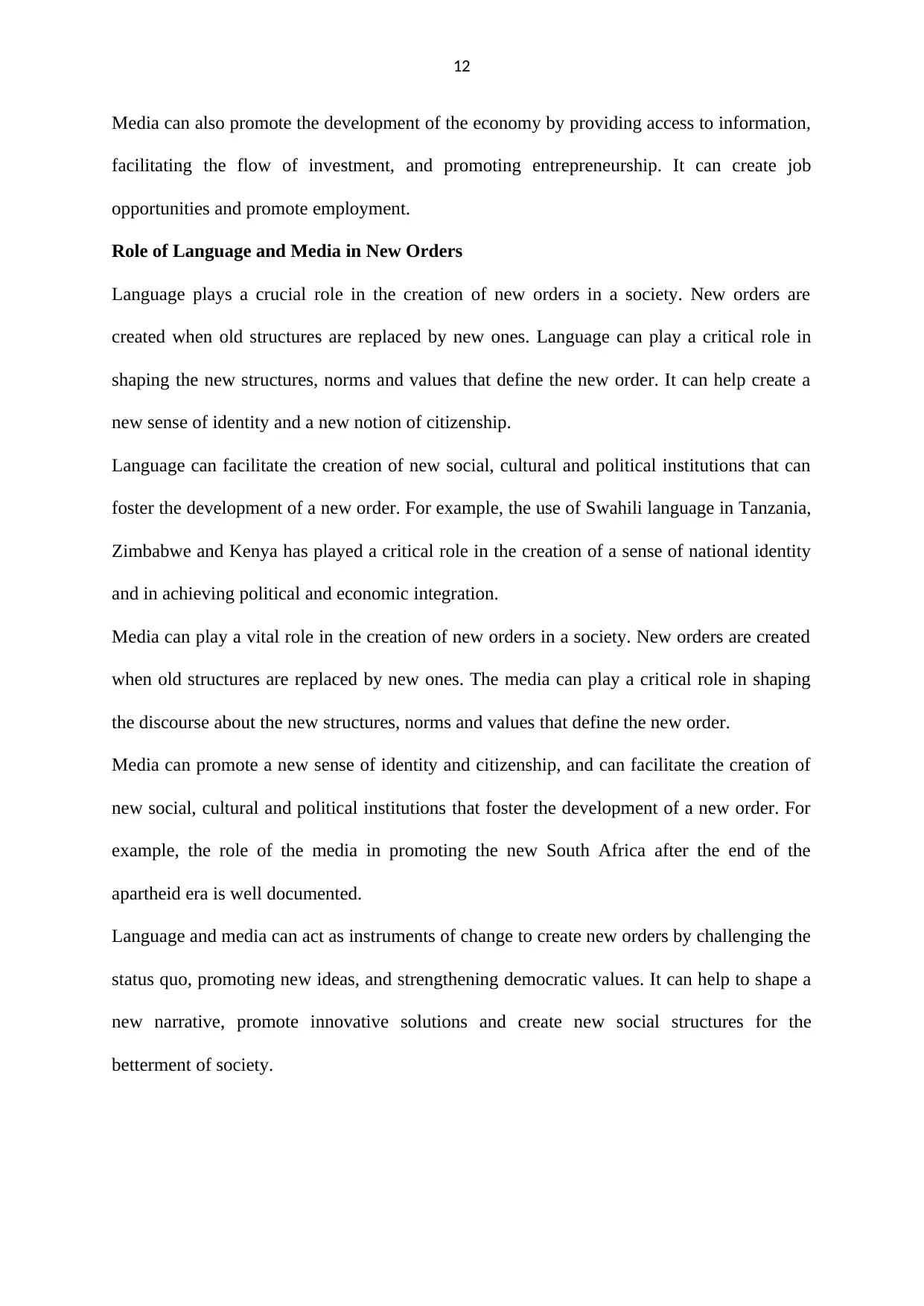
12
Media can also promote the development of the economy by providing access to information,
facilitating the flow of investment, and promoting entrepreneurship. It can create job
opportunities and promote employment.
Role of Language and Media in New Orders
Language plays a crucial role in the creation of new orders in a society. New orders are
created when old structures are replaced by new ones. Language can play a critical role in
shaping the new structures, norms and values that define the new order. It can help create a
new sense of identity and a new notion of citizenship.
Language can facilitate the creation of new social, cultural and political institutions that can
foster the development of a new order. For example, the use of Swahili language in Tanzania,
Zimbabwe and Kenya has played a critical role in the creation of a sense of national identity
and in achieving political and economic integration.
Media can play a vital role in the creation of new orders in a society. New orders are created
when old structures are replaced by new ones. The media can play a critical role in shaping
the discourse about the new structures, norms and values that define the new order.
Media can promote a new sense of identity and citizenship, and can facilitate the creation of
new social, cultural and political institutions that foster the development of a new order. For
example, the role of the media in promoting the new South Africa after the end of the
apartheid era is well documented.
Language and media can act as instruments of change to create new orders by challenging the
status quo, promoting new ideas, and strengthening democratic values. It can help to shape a
new narrative, promote innovative solutions and create new social structures for the
betterment of society.
Media can also promote the development of the economy by providing access to information,
facilitating the flow of investment, and promoting entrepreneurship. It can create job
opportunities and promote employment.
Role of Language and Media in New Orders
Language plays a crucial role in the creation of new orders in a society. New orders are
created when old structures are replaced by new ones. Language can play a critical role in
shaping the new structures, norms and values that define the new order. It can help create a
new sense of identity and a new notion of citizenship.
Language can facilitate the creation of new social, cultural and political institutions that can
foster the development of a new order. For example, the use of Swahili language in Tanzania,
Zimbabwe and Kenya has played a critical role in the creation of a sense of national identity
and in achieving political and economic integration.
Media can play a vital role in the creation of new orders in a society. New orders are created
when old structures are replaced by new ones. The media can play a critical role in shaping
the discourse about the new structures, norms and values that define the new order.
Media can promote a new sense of identity and citizenship, and can facilitate the creation of
new social, cultural and political institutions that foster the development of a new order. For
example, the role of the media in promoting the new South Africa after the end of the
apartheid era is well documented.
Language and media can act as instruments of change to create new orders by challenging the
status quo, promoting new ideas, and strengthening democratic values. It can help to shape a
new narrative, promote innovative solutions and create new social structures for the
betterment of society.
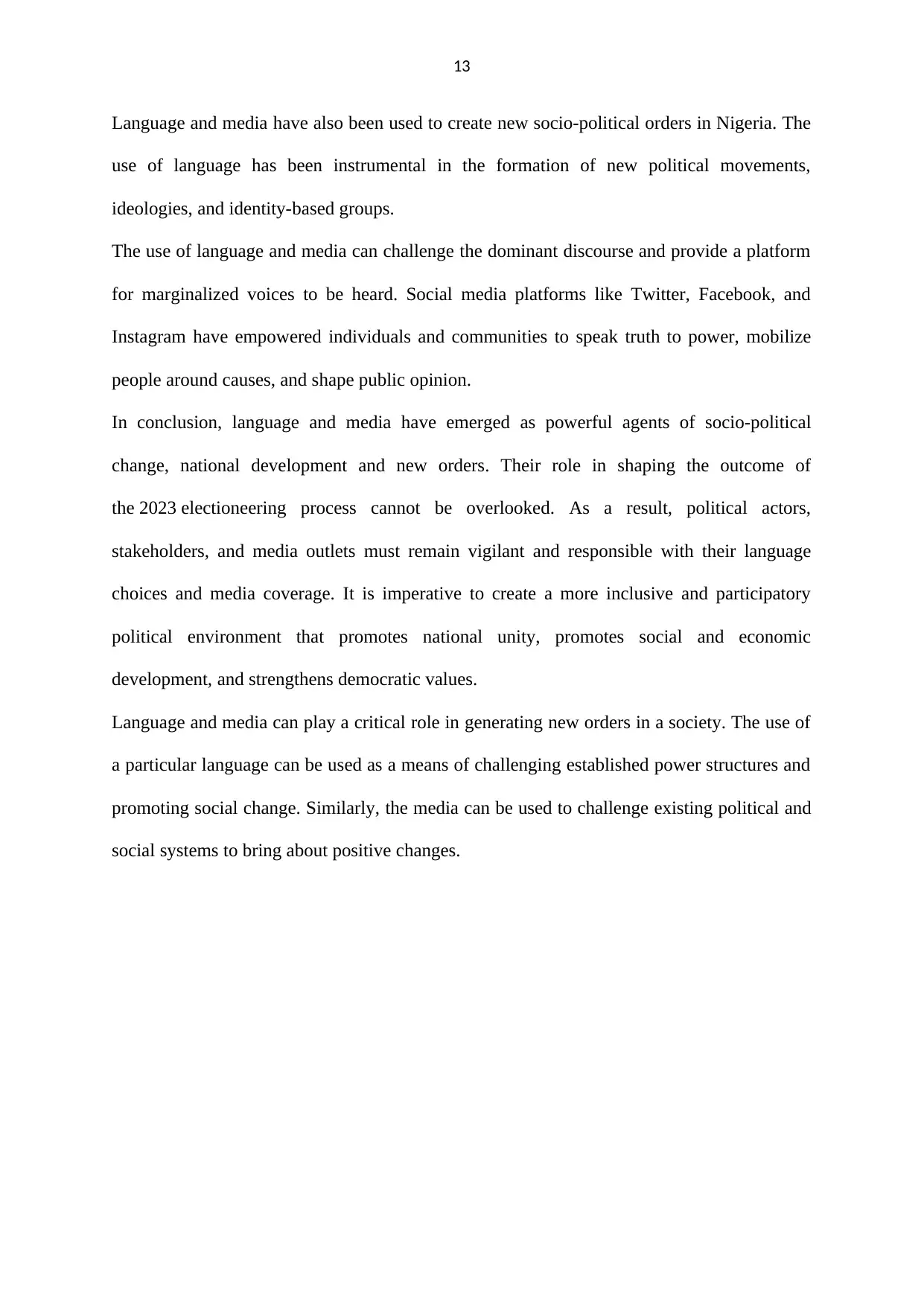
13
Language and media have also been used to create new socio-political orders in Nigeria. The
use of language has been instrumental in the formation of new political movements,
ideologies, and identity-based groups.
The use of language and media can challenge the dominant discourse and provide a platform
for marginalized voices to be heard. Social media platforms like Twitter, Facebook, and
Instagram have empowered individuals and communities to speak truth to power, mobilize
people around causes, and shape public opinion.
In conclusion, language and media have emerged as powerful agents of socio-political
change, national development and new orders. Their role in shaping the outcome of
the 2023 electioneering process cannot be overlooked. As a result, political actors,
stakeholders, and media outlets must remain vigilant and responsible with their language
choices and media coverage. It is imperative to create a more inclusive and participatory
political environment that promotes national unity, promotes social and economic
development, and strengthens democratic values.
Language and media can play a critical role in generating new orders in a society. The use of
a particular language can be used as a means of challenging established power structures and
promoting social change. Similarly, the media can be used to challenge existing political and
social systems to bring about positive changes.
Language and media have also been used to create new socio-political orders in Nigeria. The
use of language has been instrumental in the formation of new political movements,
ideologies, and identity-based groups.
The use of language and media can challenge the dominant discourse and provide a platform
for marginalized voices to be heard. Social media platforms like Twitter, Facebook, and
Instagram have empowered individuals and communities to speak truth to power, mobilize
people around causes, and shape public opinion.
In conclusion, language and media have emerged as powerful agents of socio-political
change, national development and new orders. Their role in shaping the outcome of
the 2023 electioneering process cannot be overlooked. As a result, political actors,
stakeholders, and media outlets must remain vigilant and responsible with their language
choices and media coverage. It is imperative to create a more inclusive and participatory
political environment that promotes national unity, promotes social and economic
development, and strengthens democratic values.
Language and media can play a critical role in generating new orders in a society. The use of
a particular language can be used as a means of challenging established power structures and
promoting social change. Similarly, the media can be used to challenge existing political and
social systems to bring about positive changes.
Paraphrase This Document
Need a fresh take? Get an instant paraphrase of this document with our AI Paraphraser
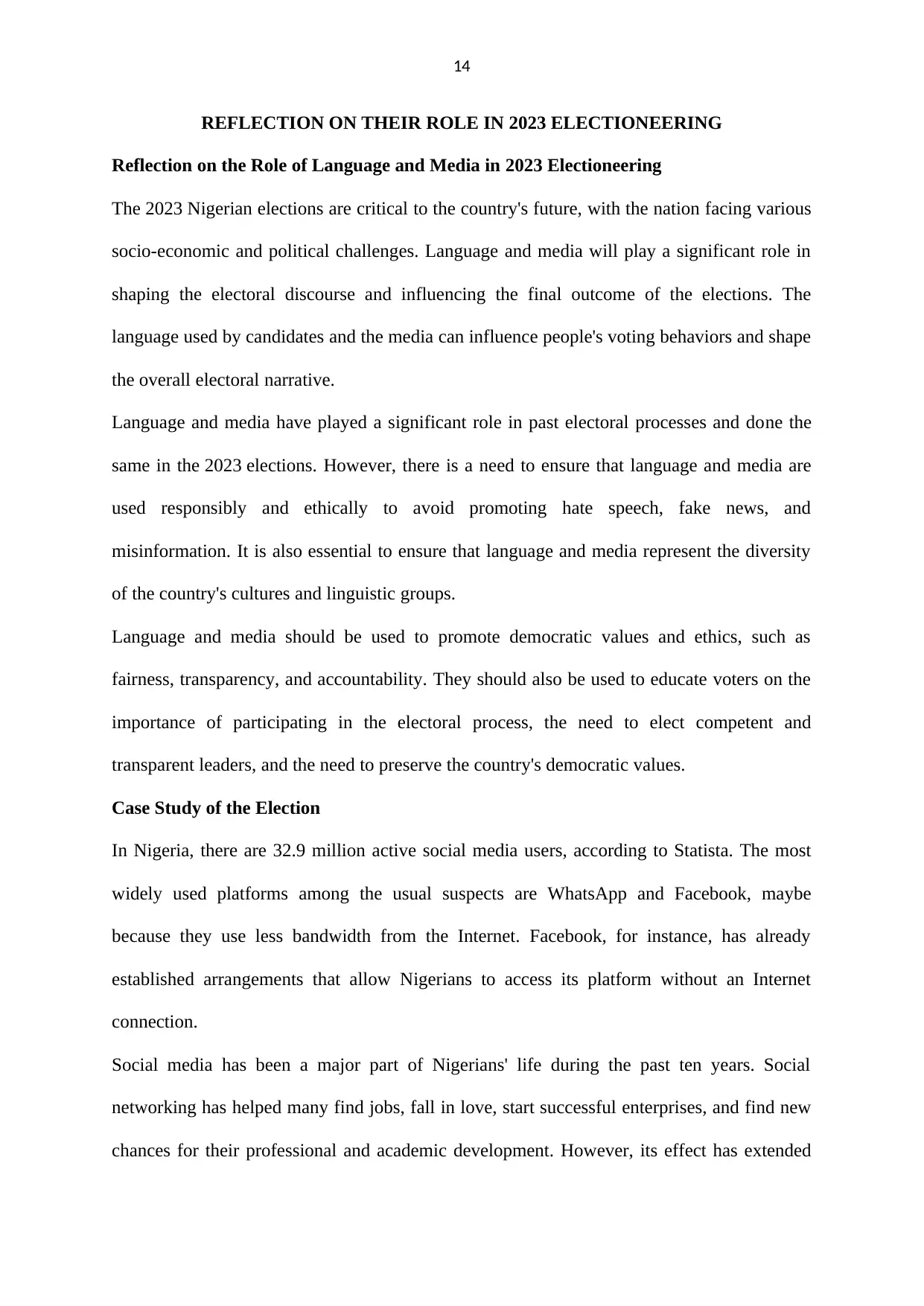
14
REFLECTION ON THEIR ROLE IN 2023 ELECTIONEERING
Reflection on the Role of Language and Media in 2023 Electioneering
The 2023 Nigerian elections are critical to the country's future, with the nation facing various
socio-economic and political challenges. Language and media will play a significant role in
shaping the electoral discourse and influencing the final outcome of the elections. The
language used by candidates and the media can influence people's voting behaviors and shape
the overall electoral narrative.
Language and media have played a significant role in past electoral processes and done the
same in the 2023 elections. However, there is a need to ensure that language and media are
used responsibly and ethically to avoid promoting hate speech, fake news, and
misinformation. It is also essential to ensure that language and media represent the diversity
of the country's cultures and linguistic groups.
Language and media should be used to promote democratic values and ethics, such as
fairness, transparency, and accountability. They should also be used to educate voters on the
importance of participating in the electoral process, the need to elect competent and
transparent leaders, and the need to preserve the country's democratic values.
Case Study of the Election
In Nigeria, there are 32.9 million active social media users, according to Statista. The most
widely used platforms among the usual suspects are WhatsApp and Facebook, maybe
because they use less bandwidth from the Internet. Facebook, for instance, has already
established arrangements that allow Nigerians to access its platform without an Internet
connection.
Social media has been a major part of Nigerians' life during the past ten years. Social
networking has helped many find jobs, fall in love, start successful enterprises, and find new
chances for their professional and academic development. However, its effect has extended
REFLECTION ON THEIR ROLE IN 2023 ELECTIONEERING
Reflection on the Role of Language and Media in 2023 Electioneering
The 2023 Nigerian elections are critical to the country's future, with the nation facing various
socio-economic and political challenges. Language and media will play a significant role in
shaping the electoral discourse and influencing the final outcome of the elections. The
language used by candidates and the media can influence people's voting behaviors and shape
the overall electoral narrative.
Language and media have played a significant role in past electoral processes and done the
same in the 2023 elections. However, there is a need to ensure that language and media are
used responsibly and ethically to avoid promoting hate speech, fake news, and
misinformation. It is also essential to ensure that language and media represent the diversity
of the country's cultures and linguistic groups.
Language and media should be used to promote democratic values and ethics, such as
fairness, transparency, and accountability. They should also be used to educate voters on the
importance of participating in the electoral process, the need to elect competent and
transparent leaders, and the need to preserve the country's democratic values.
Case Study of the Election
In Nigeria, there are 32.9 million active social media users, according to Statista. The most
widely used platforms among the usual suspects are WhatsApp and Facebook, maybe
because they use less bandwidth from the Internet. Facebook, for instance, has already
established arrangements that allow Nigerians to access its platform without an Internet
connection.
Social media has been a major part of Nigerians' life during the past ten years. Social
networking has helped many find jobs, fall in love, start successful enterprises, and find new
chances for their professional and academic development. However, its effect has extended
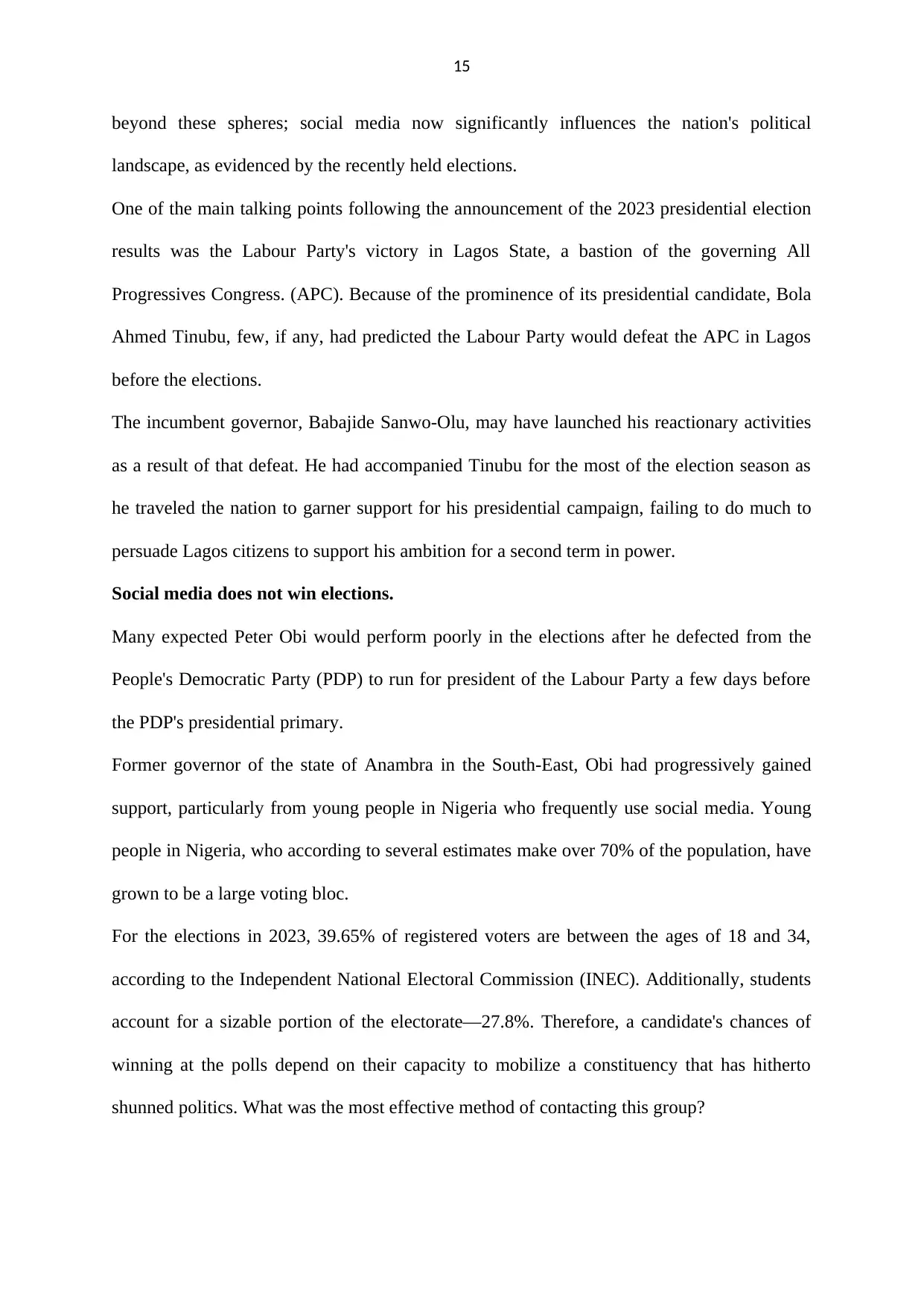
15
beyond these spheres; social media now significantly influences the nation's political
landscape, as evidenced by the recently held elections.
One of the main talking points following the announcement of the 2023 presidential election
results was the Labour Party's victory in Lagos State, a bastion of the governing All
Progressives Congress. (APC). Because of the prominence of its presidential candidate, Bola
Ahmed Tinubu, few, if any, had predicted the Labour Party would defeat the APC in Lagos
before the elections.
The incumbent governor, Babajide Sanwo-Olu, may have launched his reactionary activities
as a result of that defeat. He had accompanied Tinubu for the most of the election season as
he traveled the nation to garner support for his presidential campaign, failing to do much to
persuade Lagos citizens to support his ambition for a second term in power.
Social media does not win elections.
Many expected Peter Obi would perform poorly in the elections after he defected from the
People's Democratic Party (PDP) to run for president of the Labour Party a few days before
the PDP's presidential primary.
Former governor of the state of Anambra in the South-East, Obi had progressively gained
support, particularly from young people in Nigeria who frequently use social media. Young
people in Nigeria, who according to several estimates make over 70% of the population, have
grown to be a large voting bloc.
For the elections in 2023, 39.65% of registered voters are between the ages of 18 and 34,
according to the Independent National Electoral Commission (INEC). Additionally, students
account for a sizable portion of the electorate—27.8%. Therefore, a candidate's chances of
winning at the polls depend on their capacity to mobilize a constituency that has hitherto
shunned politics. What was the most effective method of contacting this group?
beyond these spheres; social media now significantly influences the nation's political
landscape, as evidenced by the recently held elections.
One of the main talking points following the announcement of the 2023 presidential election
results was the Labour Party's victory in Lagos State, a bastion of the governing All
Progressives Congress. (APC). Because of the prominence of its presidential candidate, Bola
Ahmed Tinubu, few, if any, had predicted the Labour Party would defeat the APC in Lagos
before the elections.
The incumbent governor, Babajide Sanwo-Olu, may have launched his reactionary activities
as a result of that defeat. He had accompanied Tinubu for the most of the election season as
he traveled the nation to garner support for his presidential campaign, failing to do much to
persuade Lagos citizens to support his ambition for a second term in power.
Social media does not win elections.
Many expected Peter Obi would perform poorly in the elections after he defected from the
People's Democratic Party (PDP) to run for president of the Labour Party a few days before
the PDP's presidential primary.
Former governor of the state of Anambra in the South-East, Obi had progressively gained
support, particularly from young people in Nigeria who frequently use social media. Young
people in Nigeria, who according to several estimates make over 70% of the population, have
grown to be a large voting bloc.
For the elections in 2023, 39.65% of registered voters are between the ages of 18 and 34,
according to the Independent National Electoral Commission (INEC). Additionally, students
account for a sizable portion of the electorate—27.8%. Therefore, a candidate's chances of
winning at the polls depend on their capacity to mobilize a constituency that has hitherto
shunned politics. What was the most effective method of contacting this group?
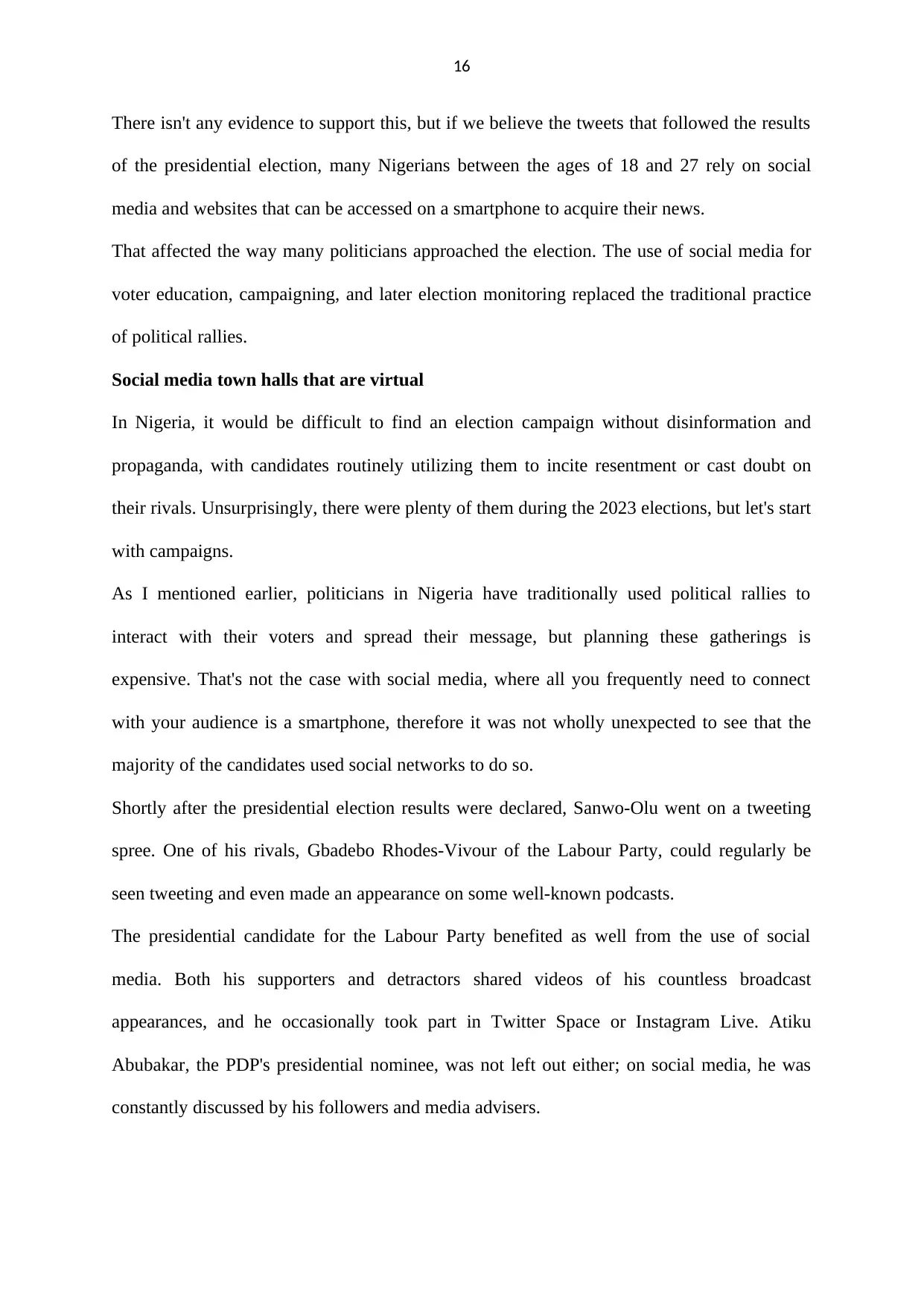
16
There isn't any evidence to support this, but if we believe the tweets that followed the results
of the presidential election, many Nigerians between the ages of 18 and 27 rely on social
media and websites that can be accessed on a smartphone to acquire their news.
That affected the way many politicians approached the election. The use of social media for
voter education, campaigning, and later election monitoring replaced the traditional practice
of political rallies.
Social media town halls that are virtual
In Nigeria, it would be difficult to find an election campaign without disinformation and
propaganda, with candidates routinely utilizing them to incite resentment or cast doubt on
their rivals. Unsurprisingly, there were plenty of them during the 2023 elections, but let's start
with campaigns.
As I mentioned earlier, politicians in Nigeria have traditionally used political rallies to
interact with their voters and spread their message, but planning these gatherings is
expensive. That's not the case with social media, where all you frequently need to connect
with your audience is a smartphone, therefore it was not wholly unexpected to see that the
majority of the candidates used social networks to do so.
Shortly after the presidential election results were declared, Sanwo-Olu went on a tweeting
spree. One of his rivals, Gbadebo Rhodes-Vivour of the Labour Party, could regularly be
seen tweeting and even made an appearance on some well-known podcasts.
The presidential candidate for the Labour Party benefited as well from the use of social
media. Both his supporters and detractors shared videos of his countless broadcast
appearances, and he occasionally took part in Twitter Space or Instagram Live. Atiku
Abubakar, the PDP's presidential nominee, was not left out either; on social media, he was
constantly discussed by his followers and media advisers.
There isn't any evidence to support this, but if we believe the tweets that followed the results
of the presidential election, many Nigerians between the ages of 18 and 27 rely on social
media and websites that can be accessed on a smartphone to acquire their news.
That affected the way many politicians approached the election. The use of social media for
voter education, campaigning, and later election monitoring replaced the traditional practice
of political rallies.
Social media town halls that are virtual
In Nigeria, it would be difficult to find an election campaign without disinformation and
propaganda, with candidates routinely utilizing them to incite resentment or cast doubt on
their rivals. Unsurprisingly, there were plenty of them during the 2023 elections, but let's start
with campaigns.
As I mentioned earlier, politicians in Nigeria have traditionally used political rallies to
interact with their voters and spread their message, but planning these gatherings is
expensive. That's not the case with social media, where all you frequently need to connect
with your audience is a smartphone, therefore it was not wholly unexpected to see that the
majority of the candidates used social networks to do so.
Shortly after the presidential election results were declared, Sanwo-Olu went on a tweeting
spree. One of his rivals, Gbadebo Rhodes-Vivour of the Labour Party, could regularly be
seen tweeting and even made an appearance on some well-known podcasts.
The presidential candidate for the Labour Party benefited as well from the use of social
media. Both his supporters and detractors shared videos of his countless broadcast
appearances, and he occasionally took part in Twitter Space or Instagram Live. Atiku
Abubakar, the PDP's presidential nominee, was not left out either; on social media, he was
constantly discussed by his followers and media advisers.
Secure Best Marks with AI Grader
Need help grading? Try our AI Grader for instant feedback on your assignments.
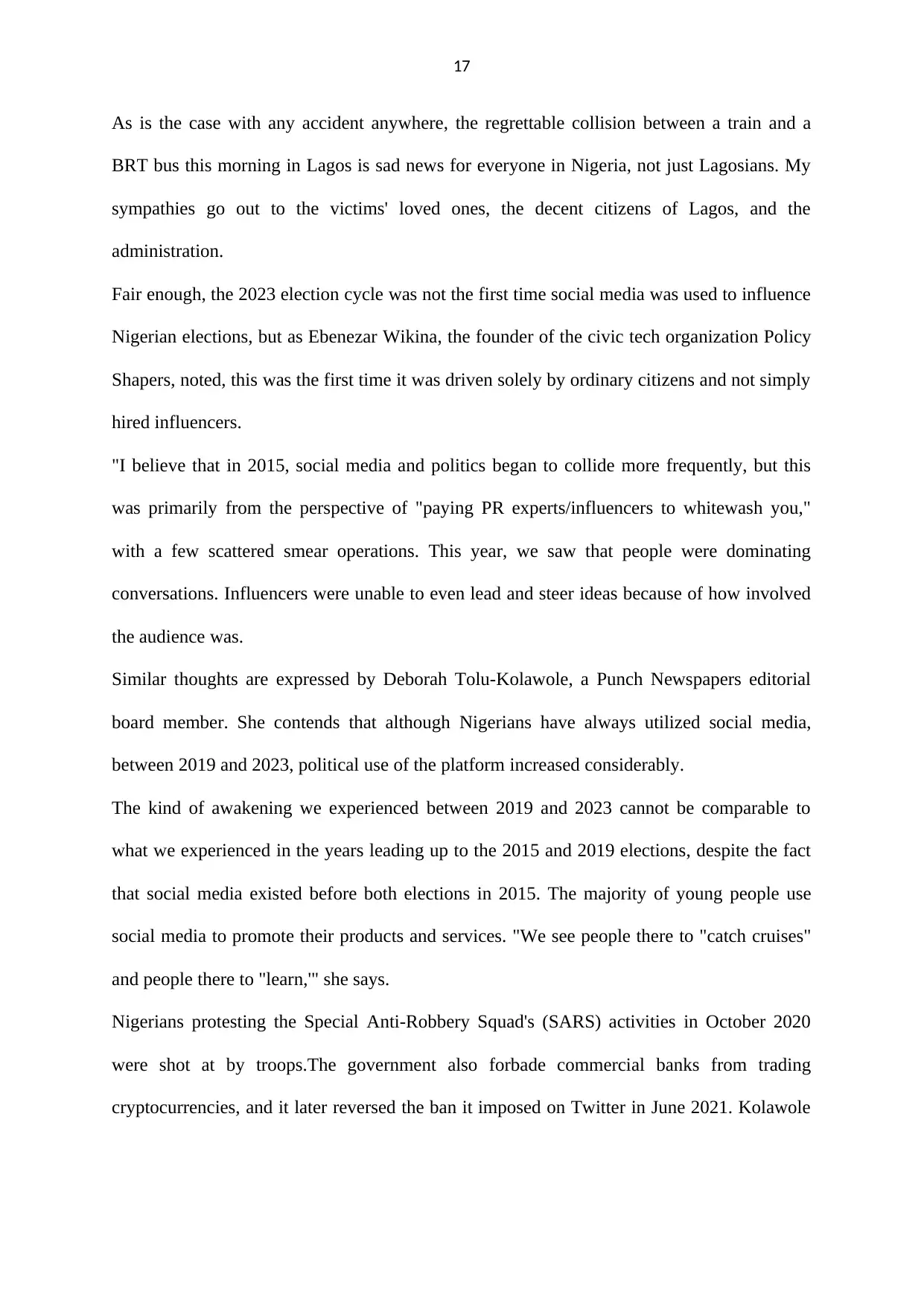
17
As is the case with any accident anywhere, the regrettable collision between a train and a
BRT bus this morning in Lagos is sad news for everyone in Nigeria, not just Lagosians. My
sympathies go out to the victims' loved ones, the decent citizens of Lagos, and the
administration.
Fair enough, the 2023 election cycle was not the first time social media was used to influence
Nigerian elections, but as Ebenezar Wikina, the founder of the civic tech organization Policy
Shapers, noted, this was the first time it was driven solely by ordinary citizens and not simply
hired influencers.
"I believe that in 2015, social media and politics began to collide more frequently, but this
was primarily from the perspective of "paying PR experts/influencers to whitewash you,"
with a few scattered smear operations. This year, we saw that people were dominating
conversations. Influencers were unable to even lead and steer ideas because of how involved
the audience was.
Similar thoughts are expressed by Deborah Tolu-Kolawole, a Punch Newspapers editorial
board member. She contends that although Nigerians have always utilized social media,
between 2019 and 2023, political use of the platform increased considerably.
The kind of awakening we experienced between 2019 and 2023 cannot be comparable to
what we experienced in the years leading up to the 2015 and 2019 elections, despite the fact
that social media existed before both elections in 2015. The majority of young people use
social media to promote their products and services. "We see people there to "catch cruises"
and people there to "learn,'" she says.
Nigerians protesting the Special Anti-Robbery Squad's (SARS) activities in October 2020
were shot at by troops.The government also forbade commercial banks from trading
cryptocurrencies, and it later reversed the ban it imposed on Twitter in June 2021. Kolawole
As is the case with any accident anywhere, the regrettable collision between a train and a
BRT bus this morning in Lagos is sad news for everyone in Nigeria, not just Lagosians. My
sympathies go out to the victims' loved ones, the decent citizens of Lagos, and the
administration.
Fair enough, the 2023 election cycle was not the first time social media was used to influence
Nigerian elections, but as Ebenezar Wikina, the founder of the civic tech organization Policy
Shapers, noted, this was the first time it was driven solely by ordinary citizens and not simply
hired influencers.
"I believe that in 2015, social media and politics began to collide more frequently, but this
was primarily from the perspective of "paying PR experts/influencers to whitewash you,"
with a few scattered smear operations. This year, we saw that people were dominating
conversations. Influencers were unable to even lead and steer ideas because of how involved
the audience was.
Similar thoughts are expressed by Deborah Tolu-Kolawole, a Punch Newspapers editorial
board member. She contends that although Nigerians have always utilized social media,
between 2019 and 2023, political use of the platform increased considerably.
The kind of awakening we experienced between 2019 and 2023 cannot be comparable to
what we experienced in the years leading up to the 2015 and 2019 elections, despite the fact
that social media existed before both elections in 2015. The majority of young people use
social media to promote their products and services. "We see people there to "catch cruises"
and people there to "learn,'" she says.
Nigerians protesting the Special Anti-Robbery Squad's (SARS) activities in October 2020
were shot at by troops.The government also forbade commercial banks from trading
cryptocurrencies, and it later reversed the ban it imposed on Twitter in June 2021. Kolawole
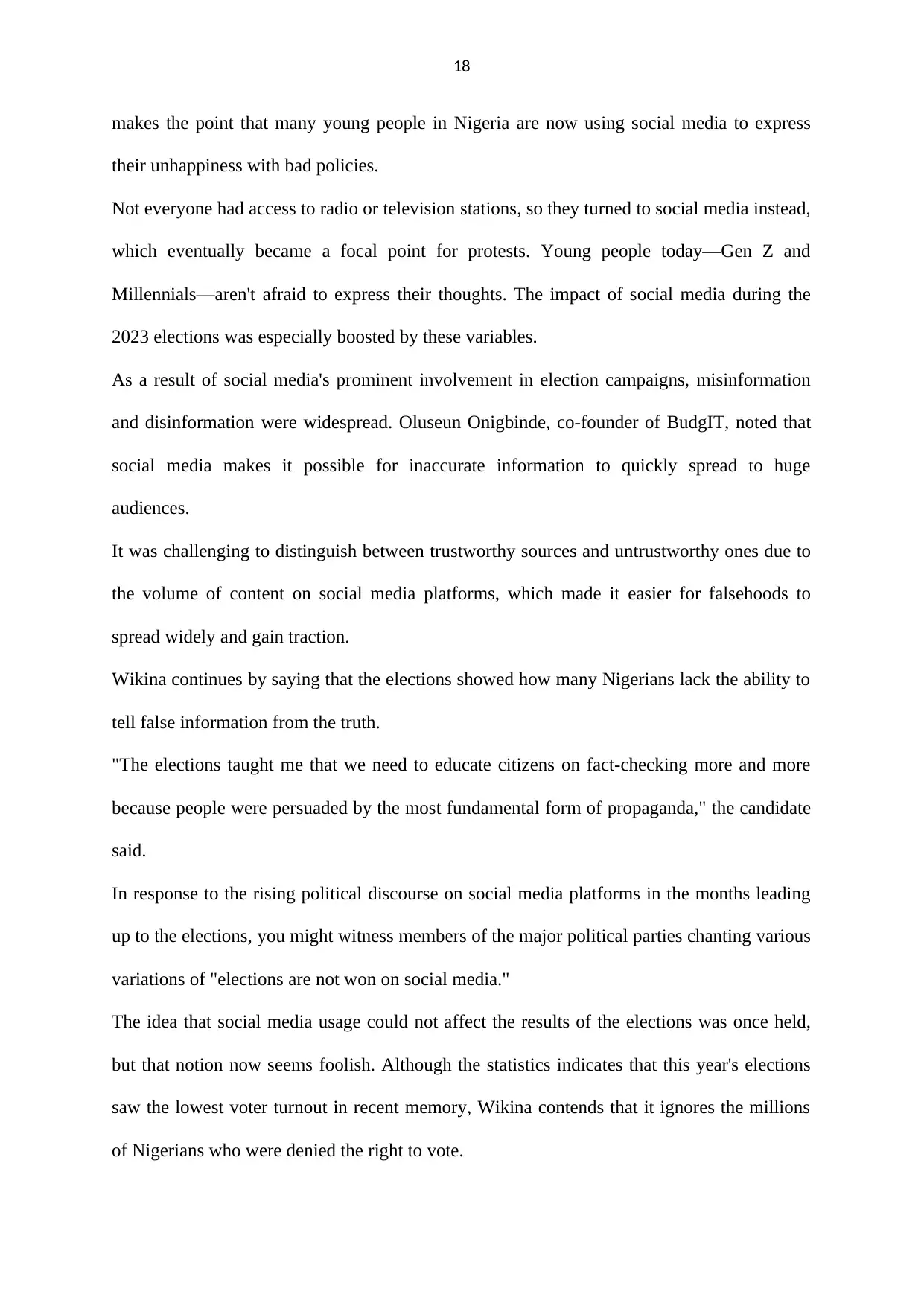
18
makes the point that many young people in Nigeria are now using social media to express
their unhappiness with bad policies.
Not everyone had access to radio or television stations, so they turned to social media instead,
which eventually became a focal point for protests. Young people today—Gen Z and
Millennials—aren't afraid to express their thoughts. The impact of social media during the
2023 elections was especially boosted by these variables.
As a result of social media's prominent involvement in election campaigns, misinformation
and disinformation were widespread. Oluseun Onigbinde, co-founder of BudgIT, noted that
social media makes it possible for inaccurate information to quickly spread to huge
audiences.
It was challenging to distinguish between trustworthy sources and untrustworthy ones due to
the volume of content on social media platforms, which made it easier for falsehoods to
spread widely and gain traction.
Wikina continues by saying that the elections showed how many Nigerians lack the ability to
tell false information from the truth.
"The elections taught me that we need to educate citizens on fact-checking more and more
because people were persuaded by the most fundamental form of propaganda," the candidate
said.
In response to the rising political discourse on social media platforms in the months leading
up to the elections, you might witness members of the major political parties chanting various
variations of "elections are not won on social media."
The idea that social media usage could not affect the results of the elections was once held,
but that notion now seems foolish. Although the statistics indicates that this year's elections
saw the lowest voter turnout in recent memory, Wikina contends that it ignores the millions
of Nigerians who were denied the right to vote.
makes the point that many young people in Nigeria are now using social media to express
their unhappiness with bad policies.
Not everyone had access to radio or television stations, so they turned to social media instead,
which eventually became a focal point for protests. Young people today—Gen Z and
Millennials—aren't afraid to express their thoughts. The impact of social media during the
2023 elections was especially boosted by these variables.
As a result of social media's prominent involvement in election campaigns, misinformation
and disinformation were widespread. Oluseun Onigbinde, co-founder of BudgIT, noted that
social media makes it possible for inaccurate information to quickly spread to huge
audiences.
It was challenging to distinguish between trustworthy sources and untrustworthy ones due to
the volume of content on social media platforms, which made it easier for falsehoods to
spread widely and gain traction.
Wikina continues by saying that the elections showed how many Nigerians lack the ability to
tell false information from the truth.
"The elections taught me that we need to educate citizens on fact-checking more and more
because people were persuaded by the most fundamental form of propaganda," the candidate
said.
In response to the rising political discourse on social media platforms in the months leading
up to the elections, you might witness members of the major political parties chanting various
variations of "elections are not won on social media."
The idea that social media usage could not affect the results of the elections was once held,
but that notion now seems foolish. Although the statistics indicates that this year's elections
saw the lowest voter turnout in recent memory, Wikina contends that it ignores the millions
of Nigerians who were denied the right to vote.
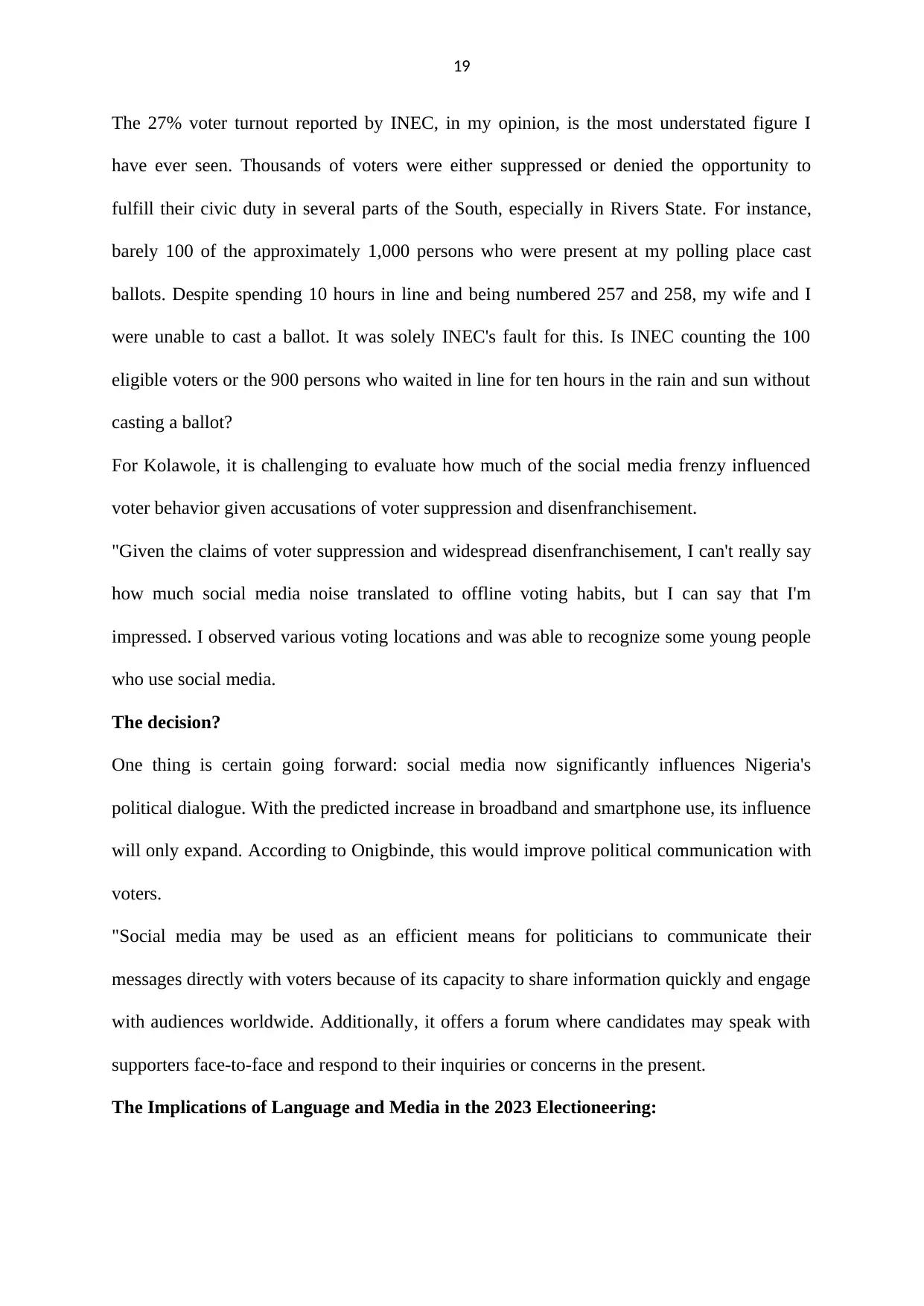
19
The 27% voter turnout reported by INEC, in my opinion, is the most understated figure I
have ever seen. Thousands of voters were either suppressed or denied the opportunity to
fulfill their civic duty in several parts of the South, especially in Rivers State. For instance,
barely 100 of the approximately 1,000 persons who were present at my polling place cast
ballots. Despite spending 10 hours in line and being numbered 257 and 258, my wife and I
were unable to cast a ballot. It was solely INEC's fault for this. Is INEC counting the 100
eligible voters or the 900 persons who waited in line for ten hours in the rain and sun without
casting a ballot?
For Kolawole, it is challenging to evaluate how much of the social media frenzy influenced
voter behavior given accusations of voter suppression and disenfranchisement.
"Given the claims of voter suppression and widespread disenfranchisement, I can't really say
how much social media noise translated to offline voting habits, but I can say that I'm
impressed. I observed various voting locations and was able to recognize some young people
who use social media.
The decision?
One thing is certain going forward: social media now significantly influences Nigeria's
political dialogue. With the predicted increase in broadband and smartphone use, its influence
will only expand. According to Onigbinde, this would improve political communication with
voters.
"Social media may be used as an efficient means for politicians to communicate their
messages directly with voters because of its capacity to share information quickly and engage
with audiences worldwide. Additionally, it offers a forum where candidates may speak with
supporters face-to-face and respond to their inquiries or concerns in the present.
The Implications of Language and Media in the 2023 Electioneering:
The 27% voter turnout reported by INEC, in my opinion, is the most understated figure I
have ever seen. Thousands of voters were either suppressed or denied the opportunity to
fulfill their civic duty in several parts of the South, especially in Rivers State. For instance,
barely 100 of the approximately 1,000 persons who were present at my polling place cast
ballots. Despite spending 10 hours in line and being numbered 257 and 258, my wife and I
were unable to cast a ballot. It was solely INEC's fault for this. Is INEC counting the 100
eligible voters or the 900 persons who waited in line for ten hours in the rain and sun without
casting a ballot?
For Kolawole, it is challenging to evaluate how much of the social media frenzy influenced
voter behavior given accusations of voter suppression and disenfranchisement.
"Given the claims of voter suppression and widespread disenfranchisement, I can't really say
how much social media noise translated to offline voting habits, but I can say that I'm
impressed. I observed various voting locations and was able to recognize some young people
who use social media.
The decision?
One thing is certain going forward: social media now significantly influences Nigeria's
political dialogue. With the predicted increase in broadband and smartphone use, its influence
will only expand. According to Onigbinde, this would improve political communication with
voters.
"Social media may be used as an efficient means for politicians to communicate their
messages directly with voters because of its capacity to share information quickly and engage
with audiences worldwide. Additionally, it offers a forum where candidates may speak with
supporters face-to-face and respond to their inquiries or concerns in the present.
The Implications of Language and Media in the 2023 Electioneering:
Paraphrase This Document
Need a fresh take? Get an instant paraphrase of this document with our AI Paraphraser
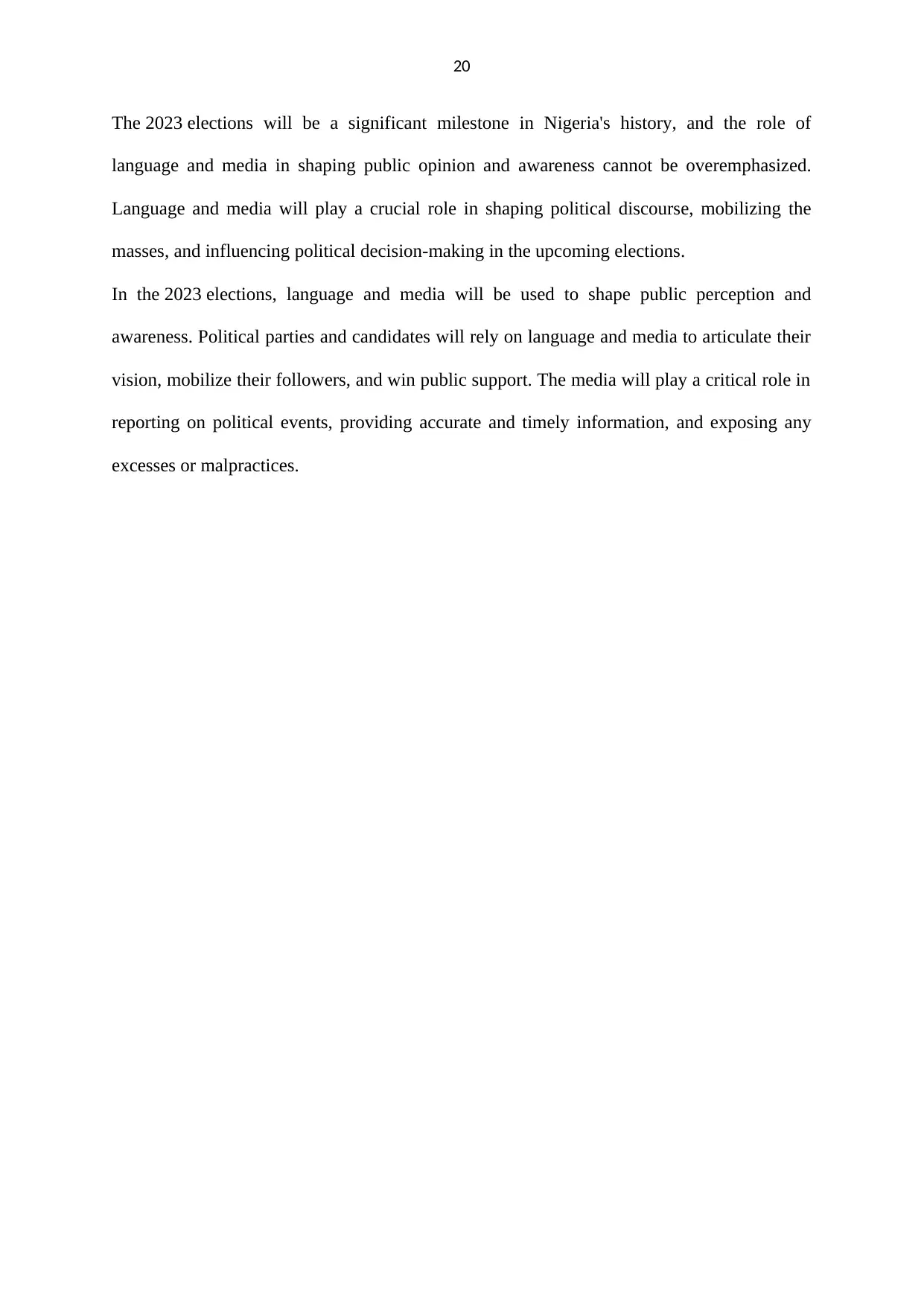
20
The 2023 elections will be a significant milestone in Nigeria's history, and the role of
language and media in shaping public opinion and awareness cannot be overemphasized.
Language and media will play a crucial role in shaping political discourse, mobilizing the
masses, and influencing political decision-making in the upcoming elections.
In the 2023 elections, language and media will be used to shape public perception and
awareness. Political parties and candidates will rely on language and media to articulate their
vision, mobilize their followers, and win public support. The media will play a critical role in
reporting on political events, providing accurate and timely information, and exposing any
excesses or malpractices.
The 2023 elections will be a significant milestone in Nigeria's history, and the role of
language and media in shaping public opinion and awareness cannot be overemphasized.
Language and media will play a crucial role in shaping political discourse, mobilizing the
masses, and influencing political decision-making in the upcoming elections.
In the 2023 elections, language and media will be used to shape public perception and
awareness. Political parties and candidates will rely on language and media to articulate their
vision, mobilize their followers, and win public support. The media will play a critical role in
reporting on political events, providing accurate and timely information, and exposing any
excesses or malpractices.
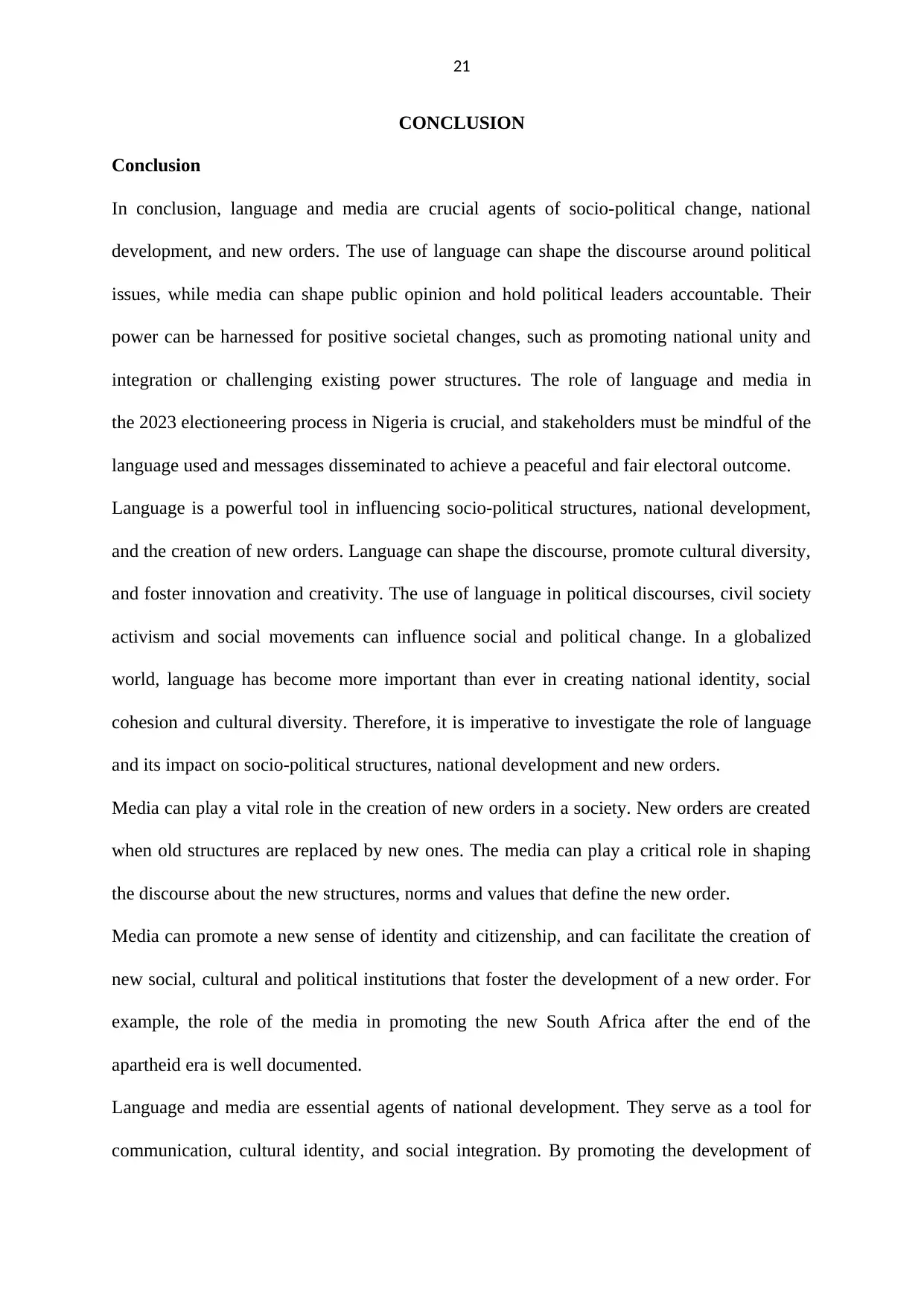
21
CONCLUSION
Conclusion
In conclusion, language and media are crucial agents of socio-political change, national
development, and new orders. The use of language can shape the discourse around political
issues, while media can shape public opinion and hold political leaders accountable. Their
power can be harnessed for positive societal changes, such as promoting national unity and
integration or challenging existing power structures. The role of language and media in
the 2023 electioneering process in Nigeria is crucial, and stakeholders must be mindful of the
language used and messages disseminated to achieve a peaceful and fair electoral outcome.
Language is a powerful tool in influencing socio-political structures, national development,
and the creation of new orders. Language can shape the discourse, promote cultural diversity,
and foster innovation and creativity. The use of language in political discourses, civil society
activism and social movements can influence social and political change. In a globalized
world, language has become more important than ever in creating national identity, social
cohesion and cultural diversity. Therefore, it is imperative to investigate the role of language
and its impact on socio-political structures, national development and new orders.
Media can play a vital role in the creation of new orders in a society. New orders are created
when old structures are replaced by new ones. The media can play a critical role in shaping
the discourse about the new structures, norms and values that define the new order.
Media can promote a new sense of identity and citizenship, and can facilitate the creation of
new social, cultural and political institutions that foster the development of a new order. For
example, the role of the media in promoting the new South Africa after the end of the
apartheid era is well documented.
Language and media are essential agents of national development. They serve as a tool for
communication, cultural identity, and social integration. By promoting the development of
CONCLUSION
Conclusion
In conclusion, language and media are crucial agents of socio-political change, national
development, and new orders. The use of language can shape the discourse around political
issues, while media can shape public opinion and hold political leaders accountable. Their
power can be harnessed for positive societal changes, such as promoting national unity and
integration or challenging existing power structures. The role of language and media in
the 2023 electioneering process in Nigeria is crucial, and stakeholders must be mindful of the
language used and messages disseminated to achieve a peaceful and fair electoral outcome.
Language is a powerful tool in influencing socio-political structures, national development,
and the creation of new orders. Language can shape the discourse, promote cultural diversity,
and foster innovation and creativity. The use of language in political discourses, civil society
activism and social movements can influence social and political change. In a globalized
world, language has become more important than ever in creating national identity, social
cohesion and cultural diversity. Therefore, it is imperative to investigate the role of language
and its impact on socio-political structures, national development and new orders.
Media can play a vital role in the creation of new orders in a society. New orders are created
when old structures are replaced by new ones. The media can play a critical role in shaping
the discourse about the new structures, norms and values that define the new order.
Media can promote a new sense of identity and citizenship, and can facilitate the creation of
new social, cultural and political institutions that foster the development of a new order. For
example, the role of the media in promoting the new South Africa after the end of the
apartheid era is well documented.
Language and media are essential agents of national development. They serve as a tool for
communication, cultural identity, and social integration. By promoting the development of
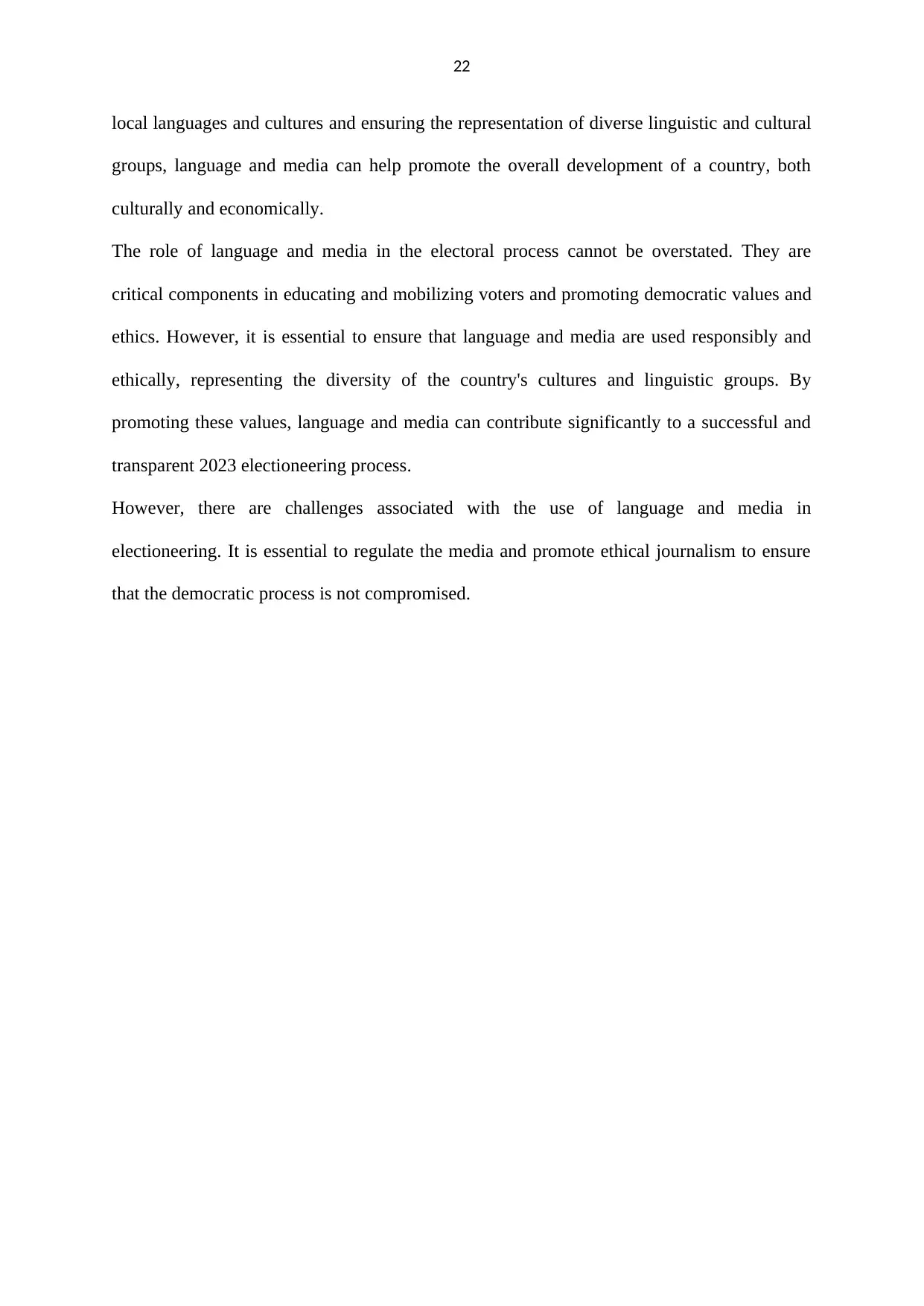
22
local languages and cultures and ensuring the representation of diverse linguistic and cultural
groups, language and media can help promote the overall development of a country, both
culturally and economically.
The role of language and media in the electoral process cannot be overstated. They are
critical components in educating and mobilizing voters and promoting democratic values and
ethics. However, it is essential to ensure that language and media are used responsibly and
ethically, representing the diversity of the country's cultures and linguistic groups. By
promoting these values, language and media can contribute significantly to a successful and
transparent 2023 electioneering process.
However, there are challenges associated with the use of language and media in
electioneering. It is essential to regulate the media and promote ethical journalism to ensure
that the democratic process is not compromised.
local languages and cultures and ensuring the representation of diverse linguistic and cultural
groups, language and media can help promote the overall development of a country, both
culturally and economically.
The role of language and media in the electoral process cannot be overstated. They are
critical components in educating and mobilizing voters and promoting democratic values and
ethics. However, it is essential to ensure that language and media are used responsibly and
ethically, representing the diversity of the country's cultures and linguistic groups. By
promoting these values, language and media can contribute significantly to a successful and
transparent 2023 electioneering process.
However, there are challenges associated with the use of language and media in
electioneering. It is essential to regulate the media and promote ethical journalism to ensure
that the democratic process is not compromised.
Secure Best Marks with AI Grader
Need help grading? Try our AI Grader for instant feedback on your assignments.
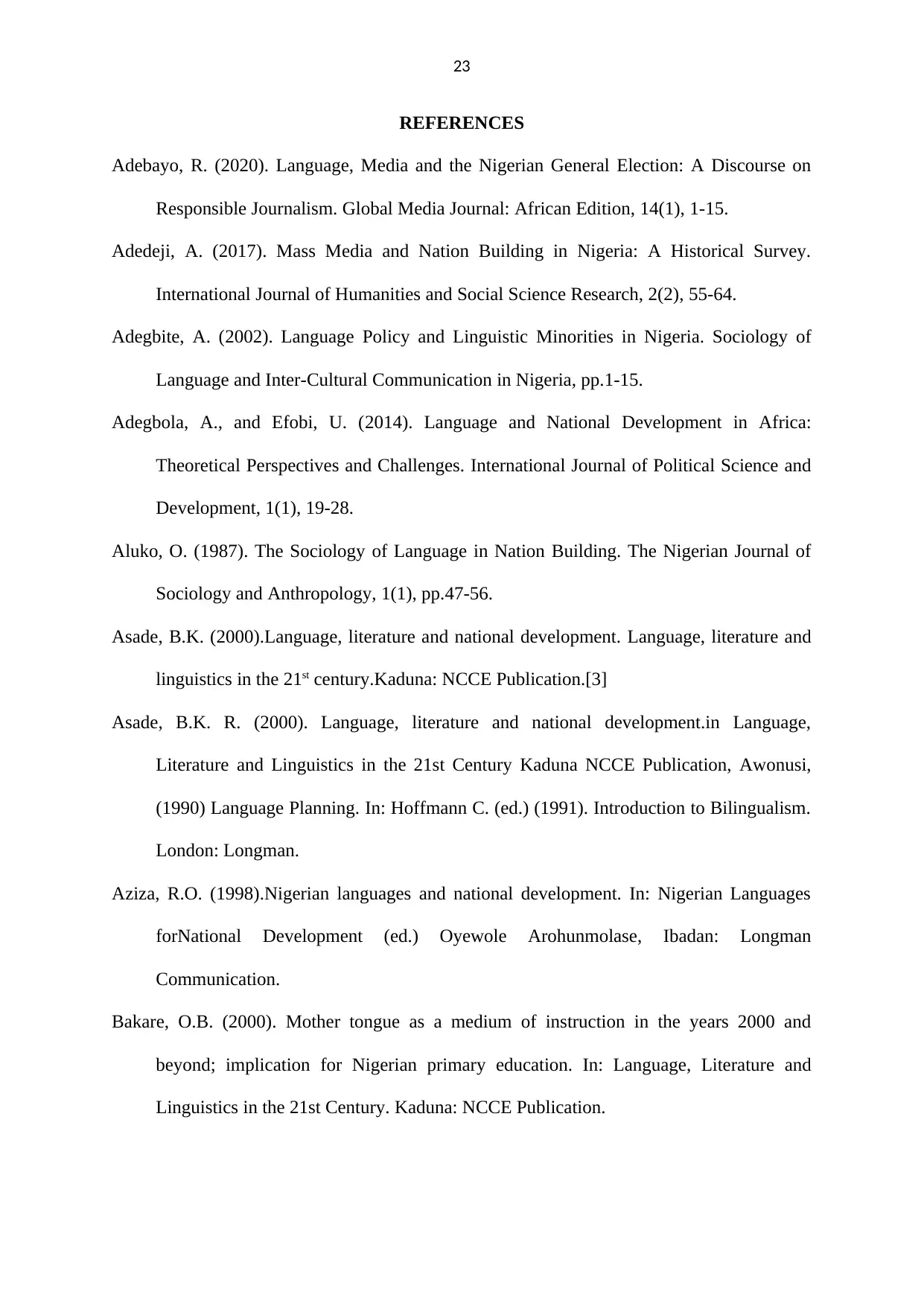
23
REFERENCES
Adebayo, R. (2020). Language, Media and the Nigerian General Election: A Discourse on
Responsible Journalism. Global Media Journal: African Edition, 14(1), 1-15.
Adedeji, A. (2017). Mass Media and Nation Building in Nigeria: A Historical Survey.
International Journal of Humanities and Social Science Research, 2(2), 55-64.
Adegbite, A. (2002). Language Policy and Linguistic Minorities in Nigeria. Sociology of
Language and Inter-Cultural Communication in Nigeria, pp.1-15.
Adegbola, A., and Efobi, U. (2014). Language and National Development in Africa:
Theoretical Perspectives and Challenges. International Journal of Political Science and
Development, 1(1), 19-28.
Aluko, O. (1987). The Sociology of Language in Nation Building. The Nigerian Journal of
Sociology and Anthropology, 1(1), pp.47-56.
Asade, B.K. (2000).Language, literature and national development. Language, literature and
linguistics in the 21st century.Kaduna: NCCE Publication.[3]
Asade, B.K. R. (2000). Language, literature and national development.in Language,
Literature and Linguistics in the 21st Century Kaduna NCCE Publication, Awonusi,
(1990) Language Planning. In: Hoffmann C. (ed.) (1991). Introduction to Bilingualism.
London: Longman.
Aziza, R.O. (1998).Nigerian languages and national development. In: Nigerian Languages
forNational Development (ed.) Oyewole Arohunmolase, Ibadan: Longman
Communication.
Bakare, O.B. (2000). Mother tongue as a medium of instruction in the years 2000 and
beyond; implication for Nigerian primary education. In: Language, Literature and
Linguistics in the 21st Century. Kaduna: NCCE Publication.
REFERENCES
Adebayo, R. (2020). Language, Media and the Nigerian General Election: A Discourse on
Responsible Journalism. Global Media Journal: African Edition, 14(1), 1-15.
Adedeji, A. (2017). Mass Media and Nation Building in Nigeria: A Historical Survey.
International Journal of Humanities and Social Science Research, 2(2), 55-64.
Adegbite, A. (2002). Language Policy and Linguistic Minorities in Nigeria. Sociology of
Language and Inter-Cultural Communication in Nigeria, pp.1-15.
Adegbola, A., and Efobi, U. (2014). Language and National Development in Africa:
Theoretical Perspectives and Challenges. International Journal of Political Science and
Development, 1(1), 19-28.
Aluko, O. (1987). The Sociology of Language in Nation Building. The Nigerian Journal of
Sociology and Anthropology, 1(1), pp.47-56.
Asade, B.K. (2000).Language, literature and national development. Language, literature and
linguistics in the 21st century.Kaduna: NCCE Publication.[3]
Asade, B.K. R. (2000). Language, literature and national development.in Language,
Literature and Linguistics in the 21st Century Kaduna NCCE Publication, Awonusi,
(1990) Language Planning. In: Hoffmann C. (ed.) (1991). Introduction to Bilingualism.
London: Longman.
Aziza, R.O. (1998).Nigerian languages and national development. In: Nigerian Languages
forNational Development (ed.) Oyewole Arohunmolase, Ibadan: Longman
Communication.
Bakare, O.B. (2000). Mother tongue as a medium of instruction in the years 2000 and
beyond; implication for Nigerian primary education. In: Language, Literature and
Linguistics in the 21st Century. Kaduna: NCCE Publication.
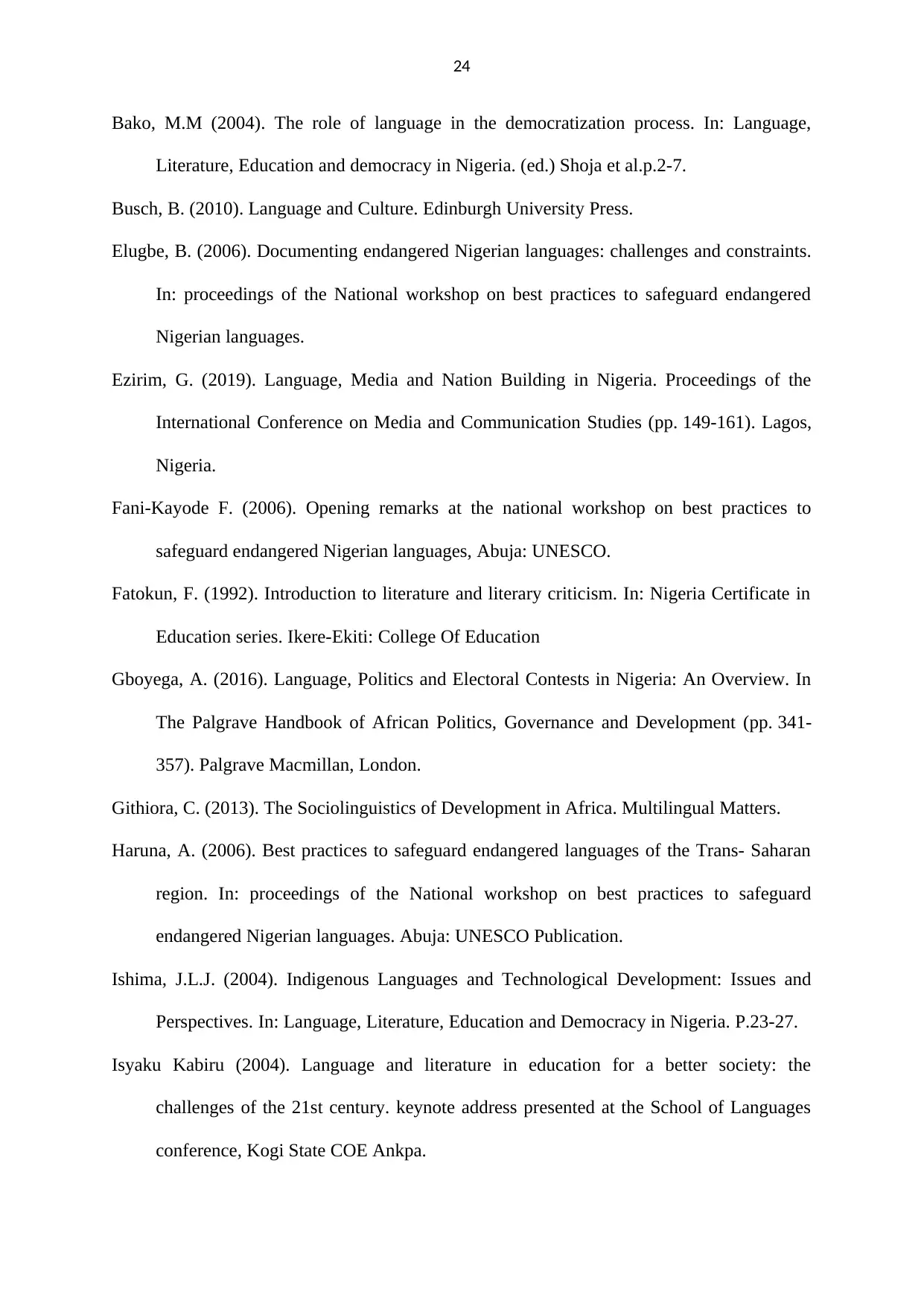
24
Bako, M.M (2004). The role of language in the democratization process. In: Language,
Literature, Education and democracy in Nigeria. (ed.) Shoja et al.p.2-7.
Busch, B. (2010). Language and Culture. Edinburgh University Press.
Elugbe, B. (2006). Documenting endangered Nigerian languages: challenges and constraints.
In: proceedings of the National workshop on best practices to safeguard endangered
Nigerian languages.
Ezirim, G. (2019). Language, Media and Nation Building in Nigeria. Proceedings of the
International Conference on Media and Communication Studies (pp. 149-161). Lagos,
Nigeria.
Fani-Kayode F. (2006). Opening remarks at the national workshop on best practices to
safeguard endangered Nigerian languages, Abuja: UNESCO.
Fatokun, F. (1992). Introduction to literature and literary criticism. In: Nigeria Certificate in
Education series. Ikere-Ekiti: College Of Education
Gboyega, A. (2016). Language, Politics and Electoral Contests in Nigeria: An Overview. In
The Palgrave Handbook of African Politics, Governance and Development (pp. 341-
357). Palgrave Macmillan, London.
Githiora, C. (2013). The Sociolinguistics of Development in Africa. Multilingual Matters.
Haruna, A. (2006). Best practices to safeguard endangered languages of the Trans- Saharan
region. In: proceedings of the National workshop on best practices to safeguard
endangered Nigerian languages. Abuja: UNESCO Publication.
Ishima, J.L.J. (2004). Indigenous Languages and Technological Development: Issues and
Perspectives. In: Language, Literature, Education and Democracy in Nigeria. P.23-27.
Isyaku Kabiru (2004). Language and literature in education for a better society: the
challenges of the 21st century. keynote address presented at the School of Languages
conference, Kogi State COE Ankpa.
Bako, M.M (2004). The role of language in the democratization process. In: Language,
Literature, Education and democracy in Nigeria. (ed.) Shoja et al.p.2-7.
Busch, B. (2010). Language and Culture. Edinburgh University Press.
Elugbe, B. (2006). Documenting endangered Nigerian languages: challenges and constraints.
In: proceedings of the National workshop on best practices to safeguard endangered
Nigerian languages.
Ezirim, G. (2019). Language, Media and Nation Building in Nigeria. Proceedings of the
International Conference on Media and Communication Studies (pp. 149-161). Lagos,
Nigeria.
Fani-Kayode F. (2006). Opening remarks at the national workshop on best practices to
safeguard endangered Nigerian languages, Abuja: UNESCO.
Fatokun, F. (1992). Introduction to literature and literary criticism. In: Nigeria Certificate in
Education series. Ikere-Ekiti: College Of Education
Gboyega, A. (2016). Language, Politics and Electoral Contests in Nigeria: An Overview. In
The Palgrave Handbook of African Politics, Governance and Development (pp. 341-
357). Palgrave Macmillan, London.
Githiora, C. (2013). The Sociolinguistics of Development in Africa. Multilingual Matters.
Haruna, A. (2006). Best practices to safeguard endangered languages of the Trans- Saharan
region. In: proceedings of the National workshop on best practices to safeguard
endangered Nigerian languages. Abuja: UNESCO Publication.
Ishima, J.L.J. (2004). Indigenous Languages and Technological Development: Issues and
Perspectives. In: Language, Literature, Education and Democracy in Nigeria. P.23-27.
Isyaku Kabiru (2004). Language and literature in education for a better society: the
challenges of the 21st century. keynote address presented at the School of Languages
conference, Kogi State COE Ankpa.
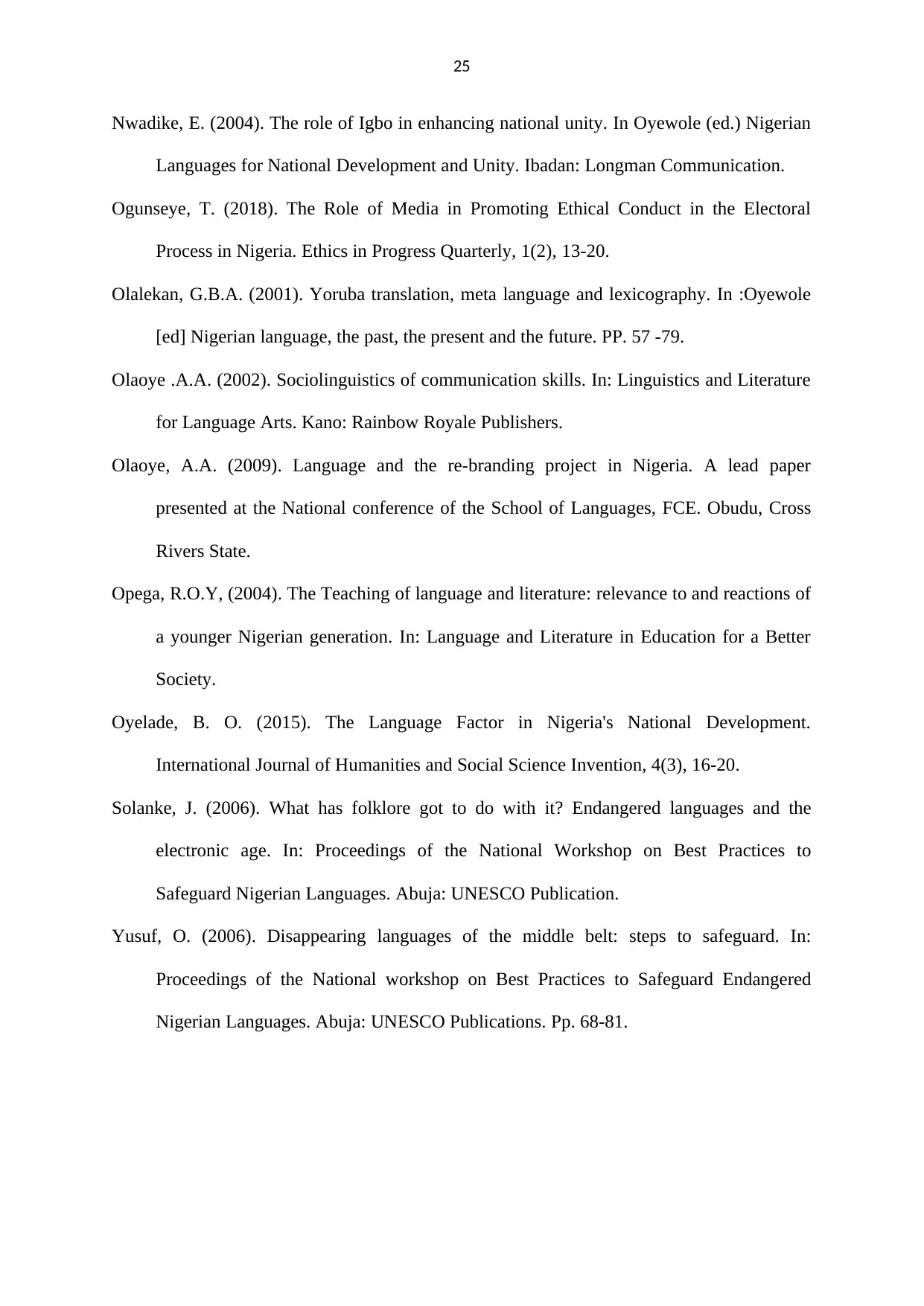
25
Nwadike, E. (2004). The role of Igbo in enhancing national unity. In Oyewole (ed.) Nigerian
Languages for National Development and Unity. Ibadan: Longman Communication.
Ogunseye, T. (2018). The Role of Media in Promoting Ethical Conduct in the Electoral
Process in Nigeria. Ethics in Progress Quarterly, 1(2), 13-20.
Olalekan, G.B.A. (2001). Yoruba translation, meta language and lexicography. In :Oyewole
[ed] Nigerian language, the past, the present and the future. PP. 57 -79.
Olaoye .A.A. (2002). Sociolinguistics of communication skills. In: Linguistics and Literature
for Language Arts. Kano: Rainbow Royale Publishers.
Olaoye, A.A. (2009). Language and the re-branding project in Nigeria. A lead paper
presented at the National conference of the School of Languages, FCE. Obudu, Cross
Rivers State.
Opega, R.O.Y, (2004). The Teaching of language and literature: relevance to and reactions of
a younger Nigerian generation. In: Language and Literature in Education for a Better
Society.
Oyelade, B. O. (2015). The Language Factor in Nigeria's National Development.
International Journal of Humanities and Social Science Invention, 4(3), 16-20.
Solanke, J. (2006). What has folklore got to do with it? Endangered languages and the
electronic age. In: Proceedings of the National Workshop on Best Practices to
Safeguard Nigerian Languages. Abuja: UNESCO Publication.
Yusuf, O. (2006). Disappearing languages of the middle belt: steps to safeguard. In:
Proceedings of the National workshop on Best Practices to Safeguard Endangered
Nigerian Languages. Abuja: UNESCO Publications. Pp. 68-81.
Nwadike, E. (2004). The role of Igbo in enhancing national unity. In Oyewole (ed.) Nigerian
Languages for National Development and Unity. Ibadan: Longman Communication.
Ogunseye, T. (2018). The Role of Media in Promoting Ethical Conduct in the Electoral
Process in Nigeria. Ethics in Progress Quarterly, 1(2), 13-20.
Olalekan, G.B.A. (2001). Yoruba translation, meta language and lexicography. In :Oyewole
[ed] Nigerian language, the past, the present and the future. PP. 57 -79.
Olaoye .A.A. (2002). Sociolinguistics of communication skills. In: Linguistics and Literature
for Language Arts. Kano: Rainbow Royale Publishers.
Olaoye, A.A. (2009). Language and the re-branding project in Nigeria. A lead paper
presented at the National conference of the School of Languages, FCE. Obudu, Cross
Rivers State.
Opega, R.O.Y, (2004). The Teaching of language and literature: relevance to and reactions of
a younger Nigerian generation. In: Language and Literature in Education for a Better
Society.
Oyelade, B. O. (2015). The Language Factor in Nigeria's National Development.
International Journal of Humanities and Social Science Invention, 4(3), 16-20.
Solanke, J. (2006). What has folklore got to do with it? Endangered languages and the
electronic age. In: Proceedings of the National Workshop on Best Practices to
Safeguard Nigerian Languages. Abuja: UNESCO Publication.
Yusuf, O. (2006). Disappearing languages of the middle belt: steps to safeguard. In:
Proceedings of the National workshop on Best Practices to Safeguard Endangered
Nigerian Languages. Abuja: UNESCO Publications. Pp. 68-81.
1 out of 25
Related Documents
Your All-in-One AI-Powered Toolkit for Academic Success.
+13062052269
info@desklib.com
Available 24*7 on WhatsApp / Email
![[object Object]](/_next/static/media/star-bottom.7253800d.svg)
Unlock your academic potential
© 2024 | Zucol Services PVT LTD | All rights reserved.





